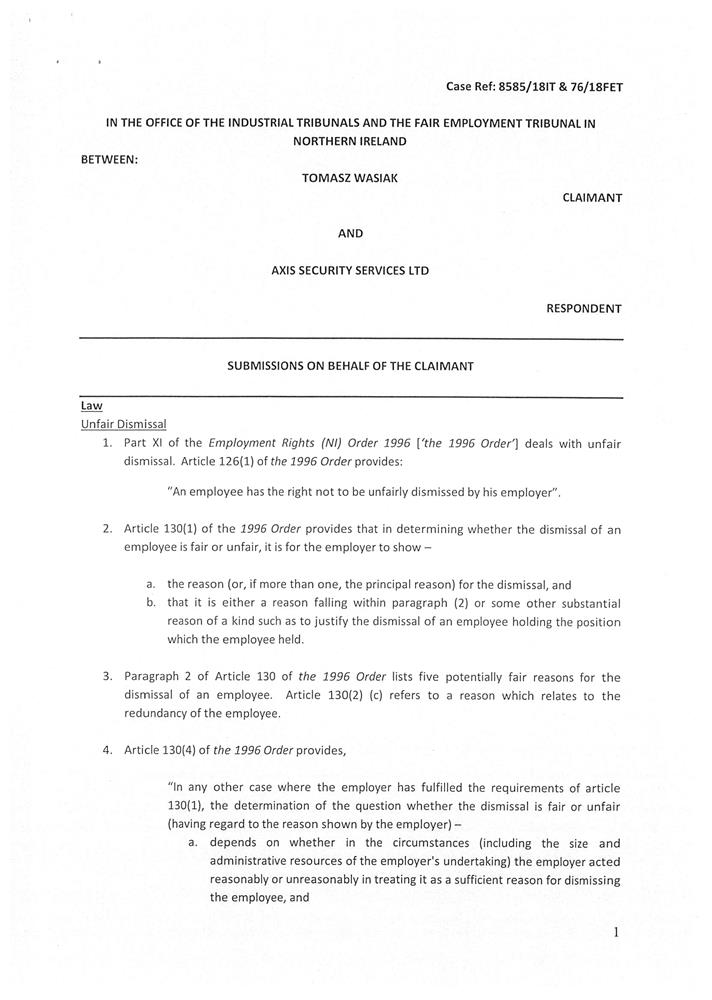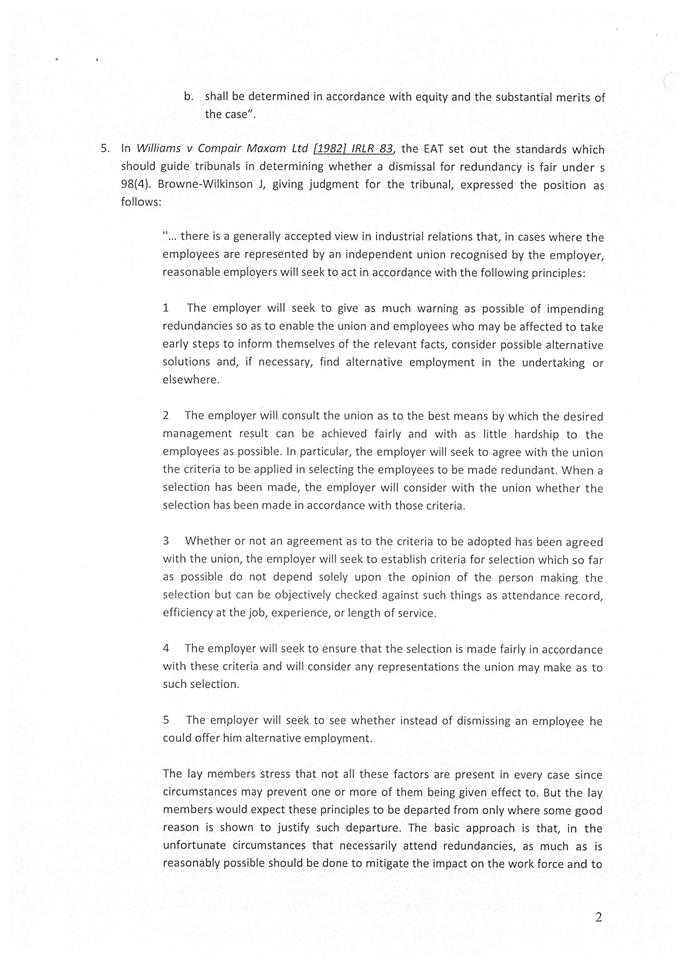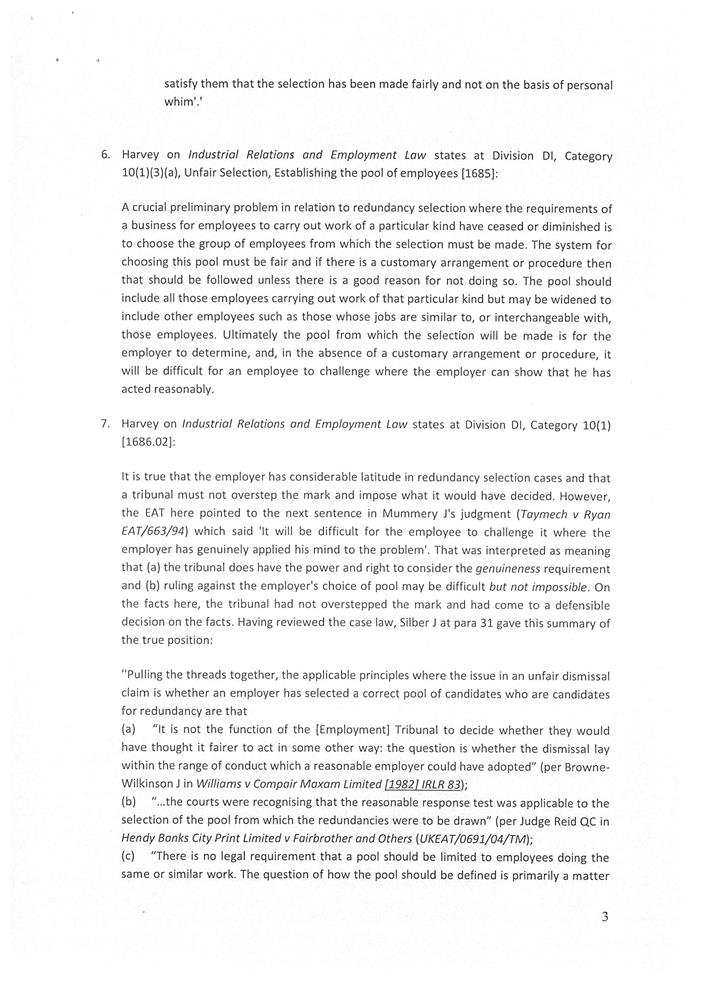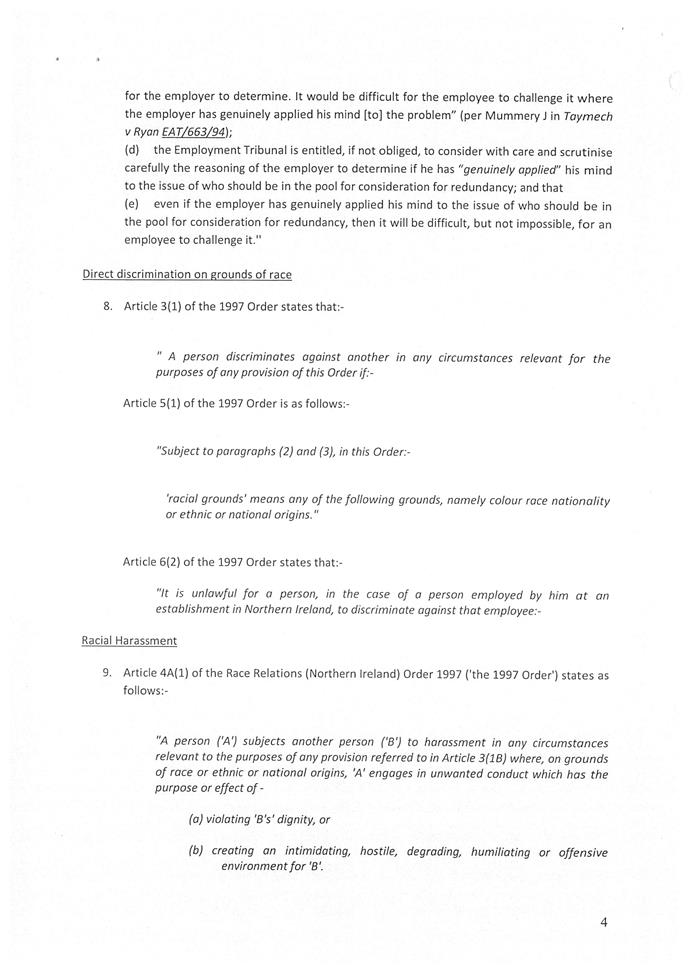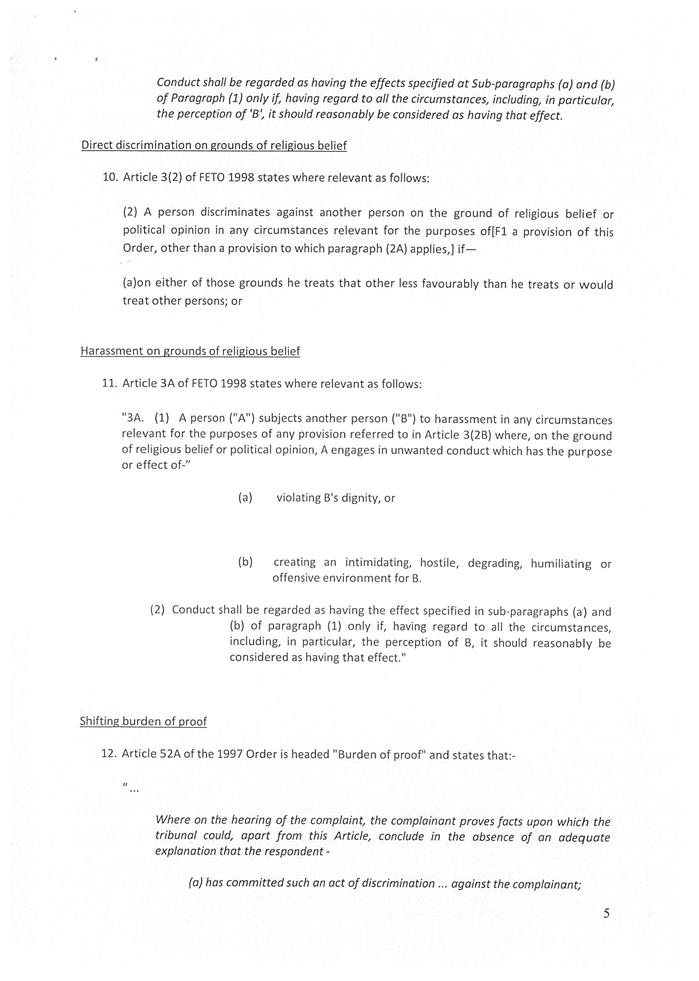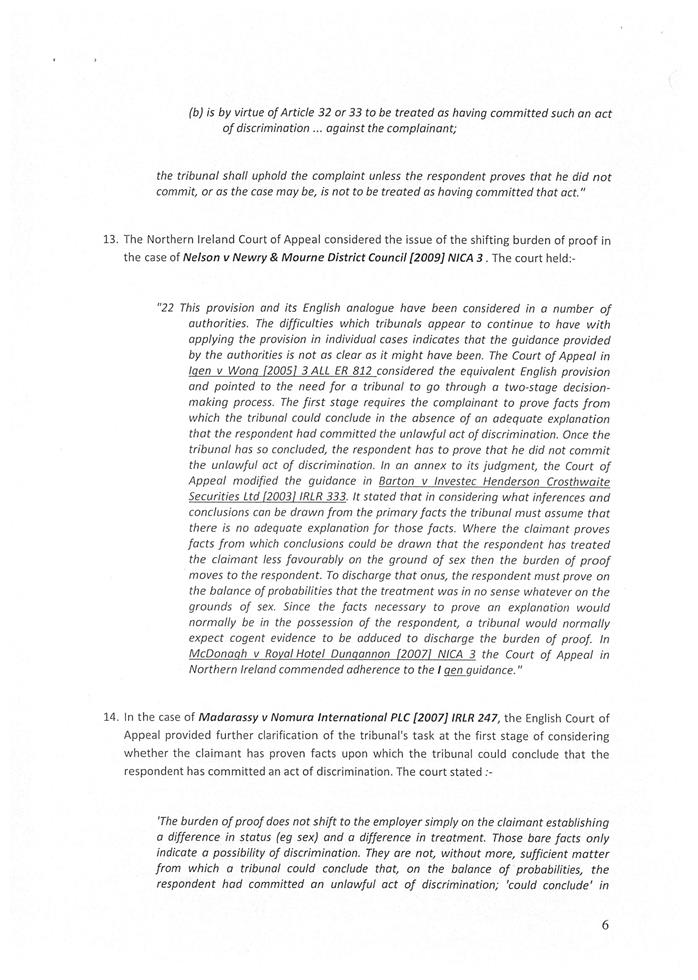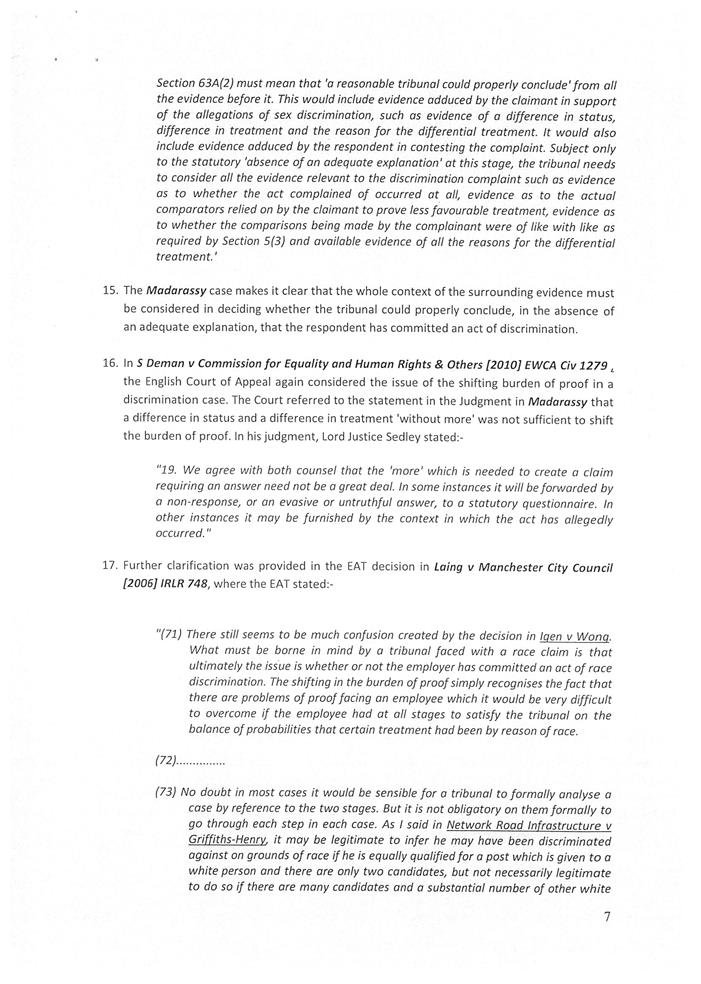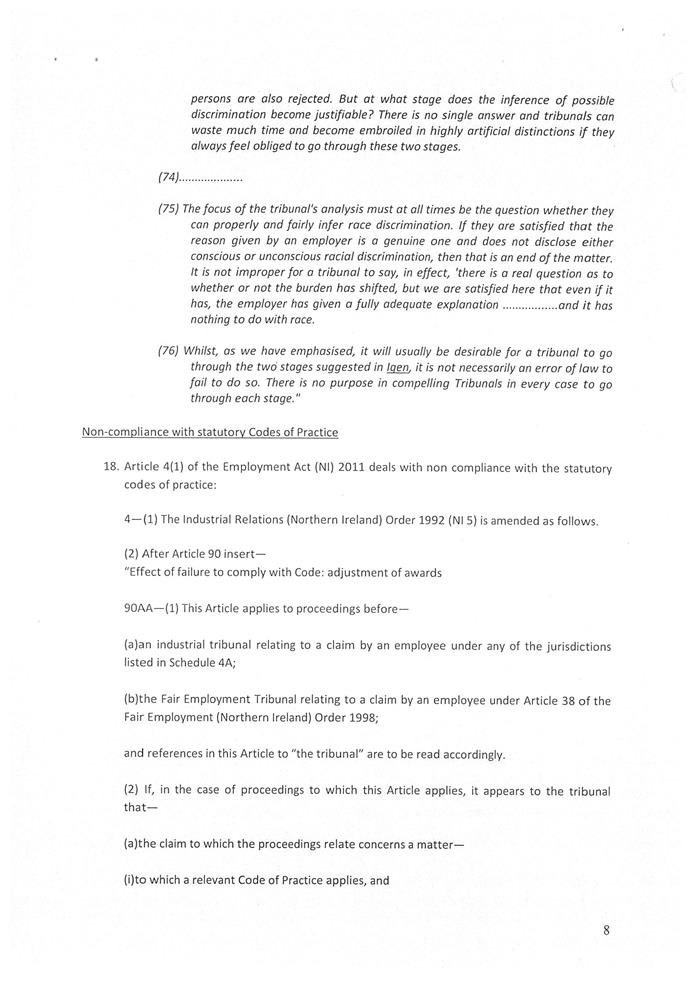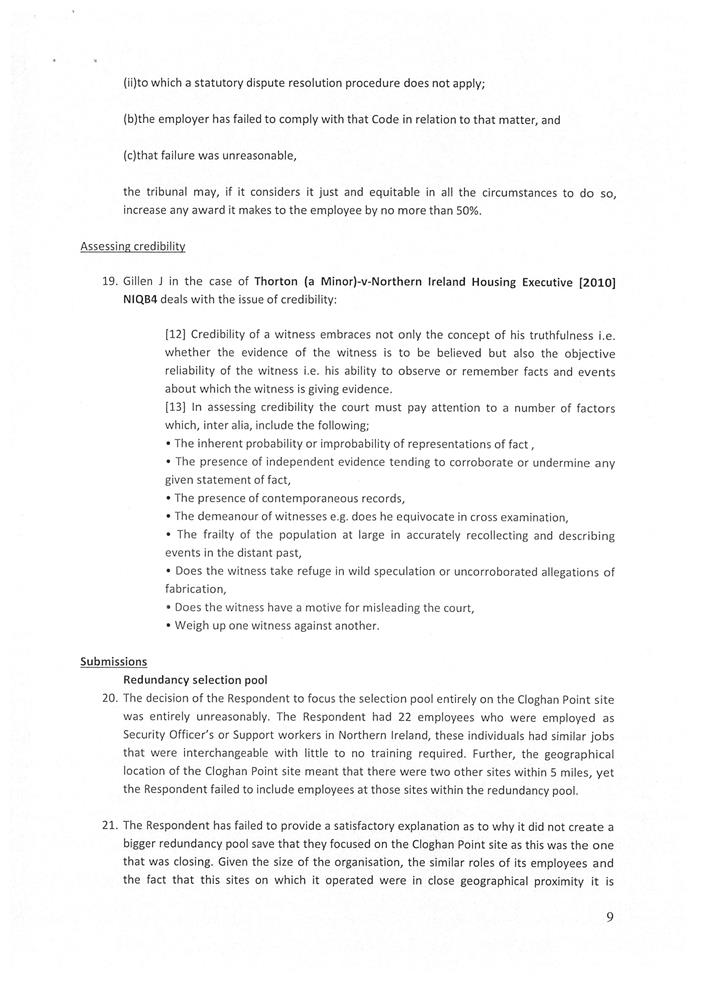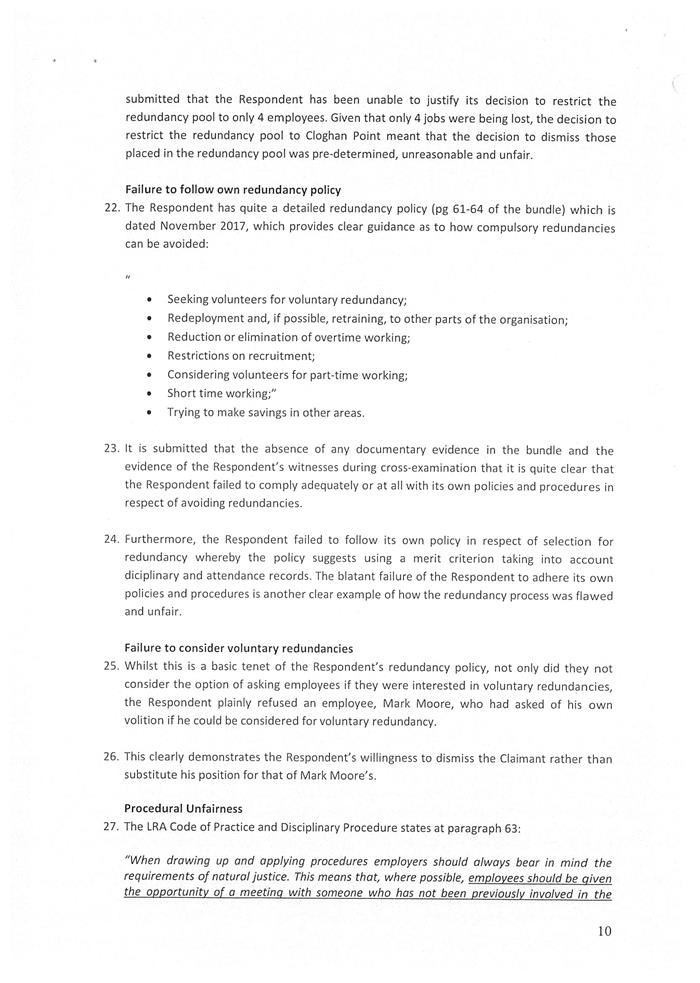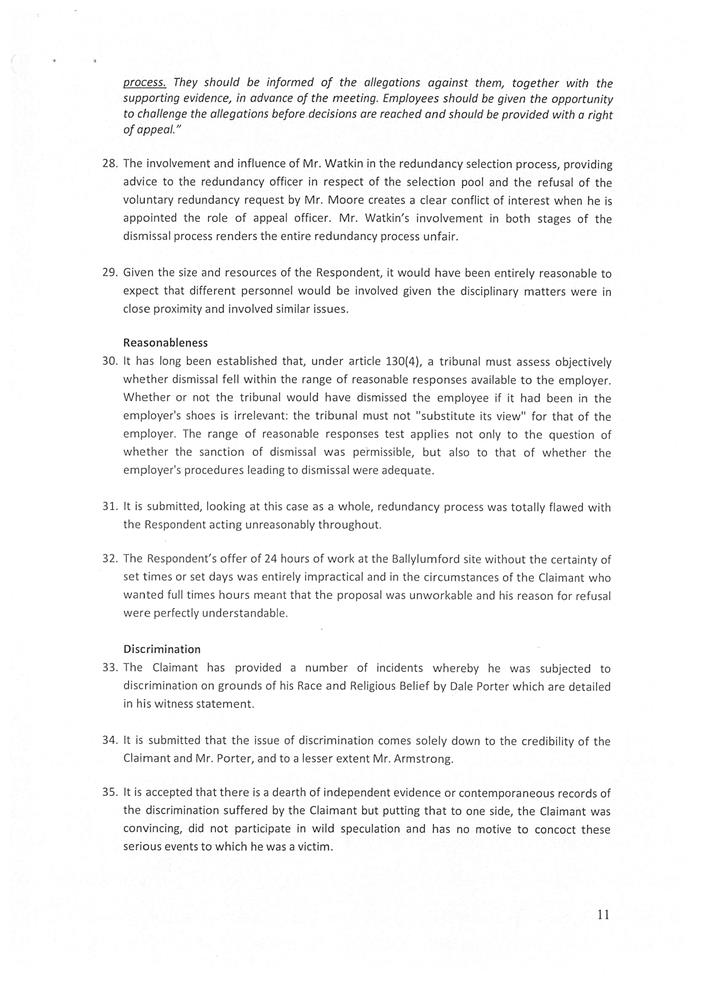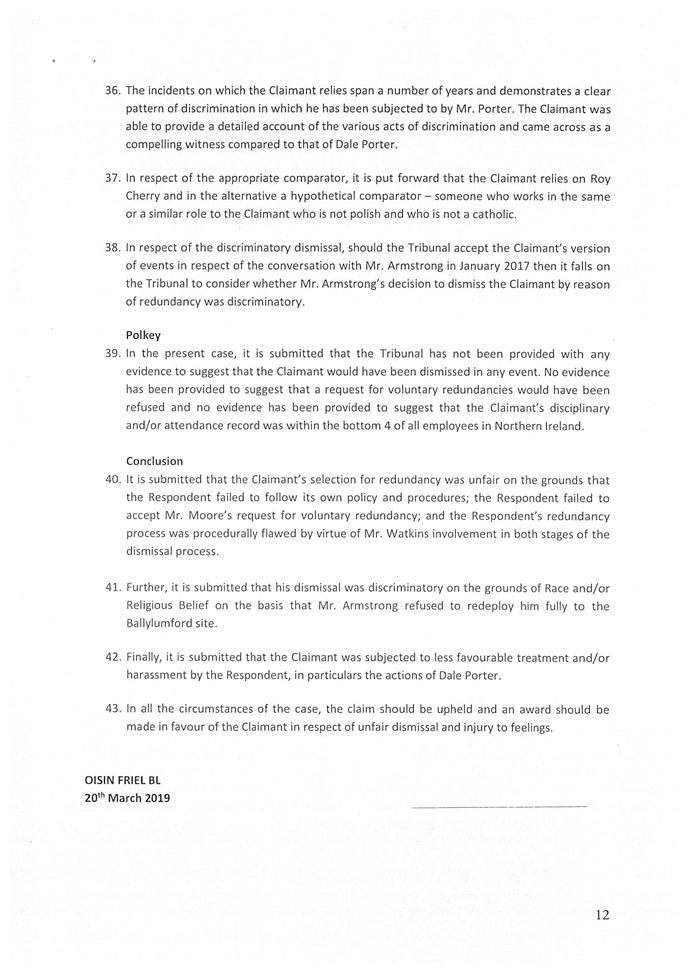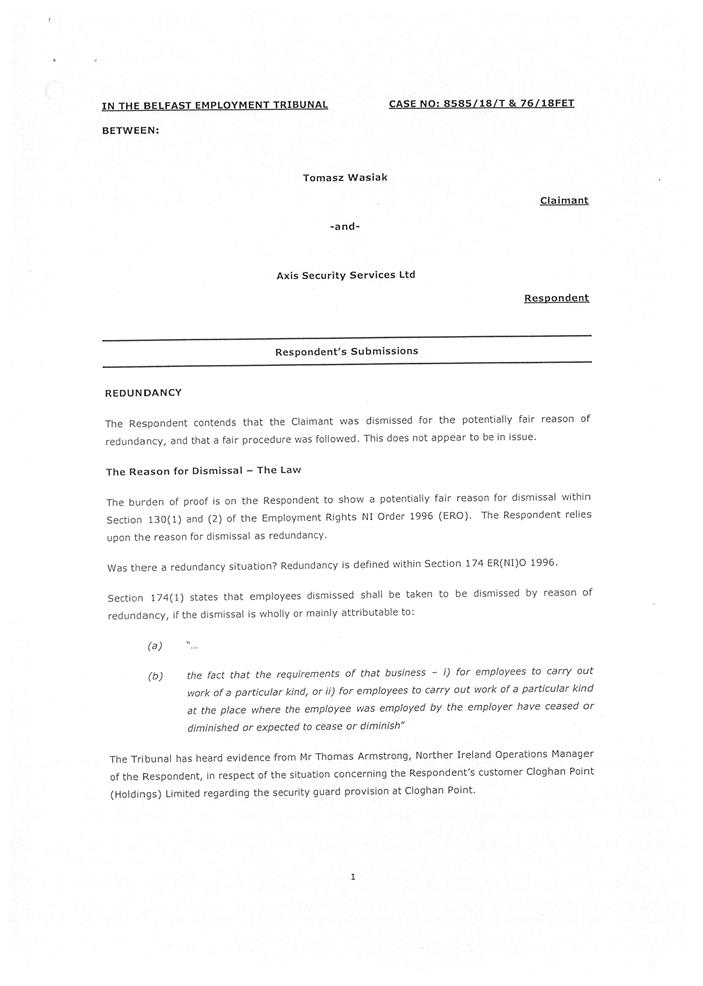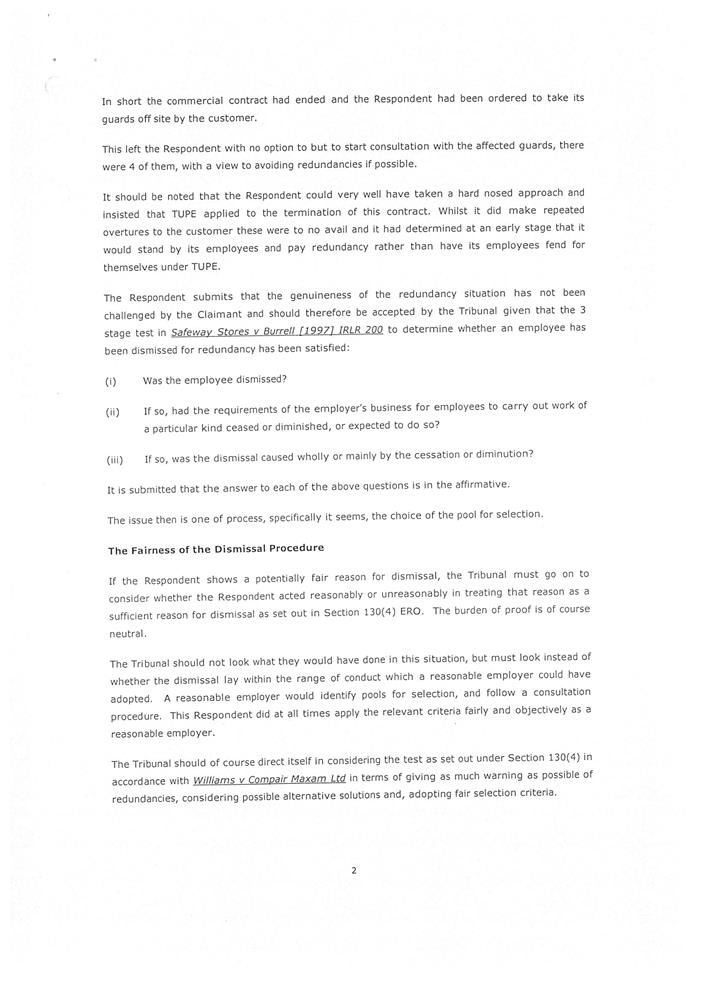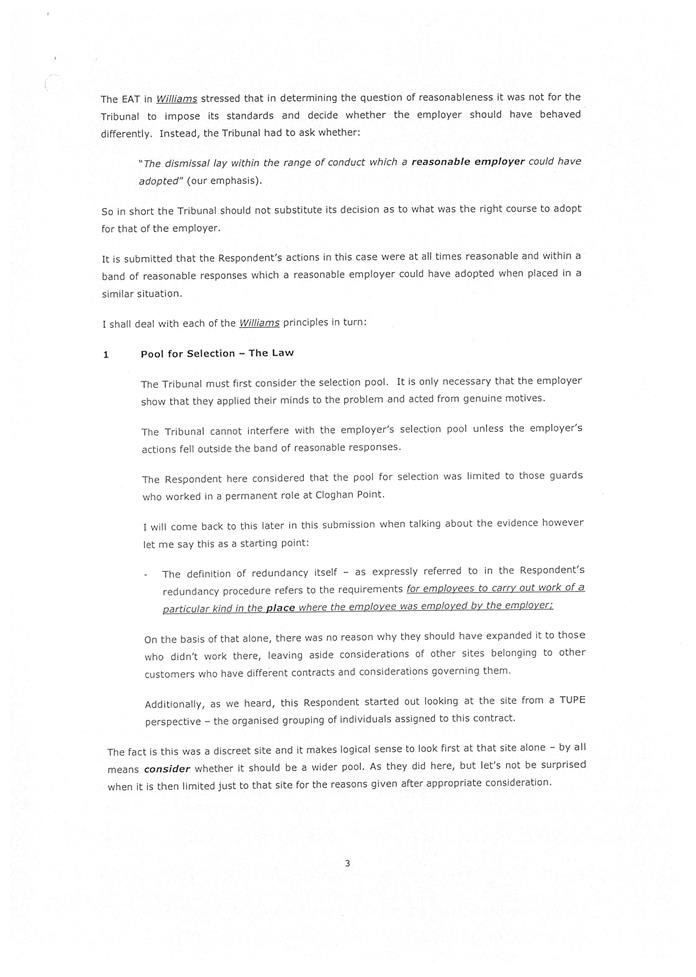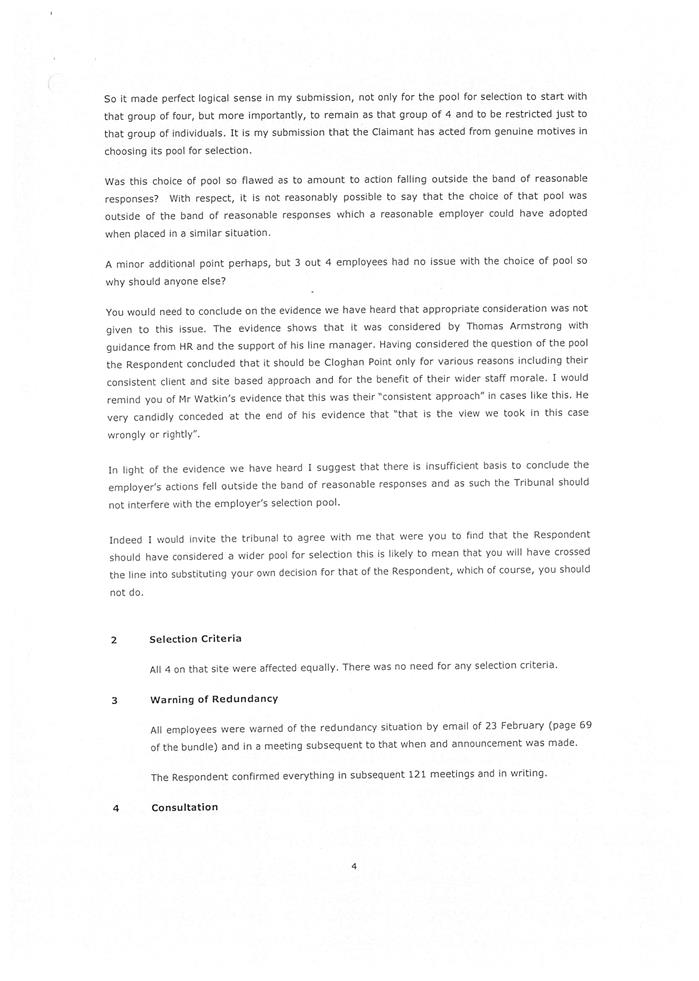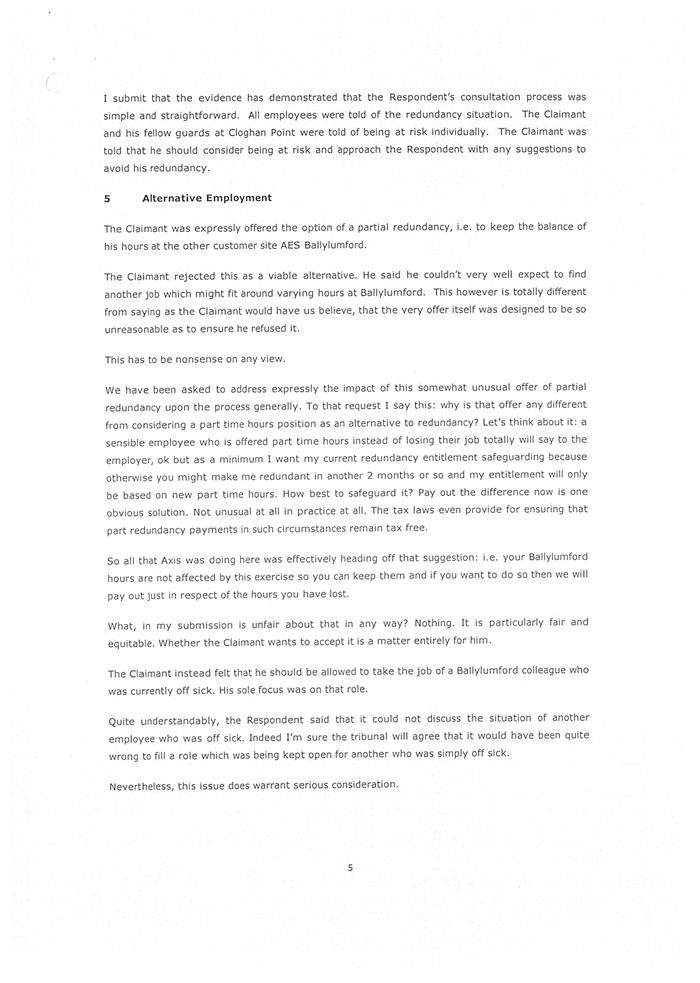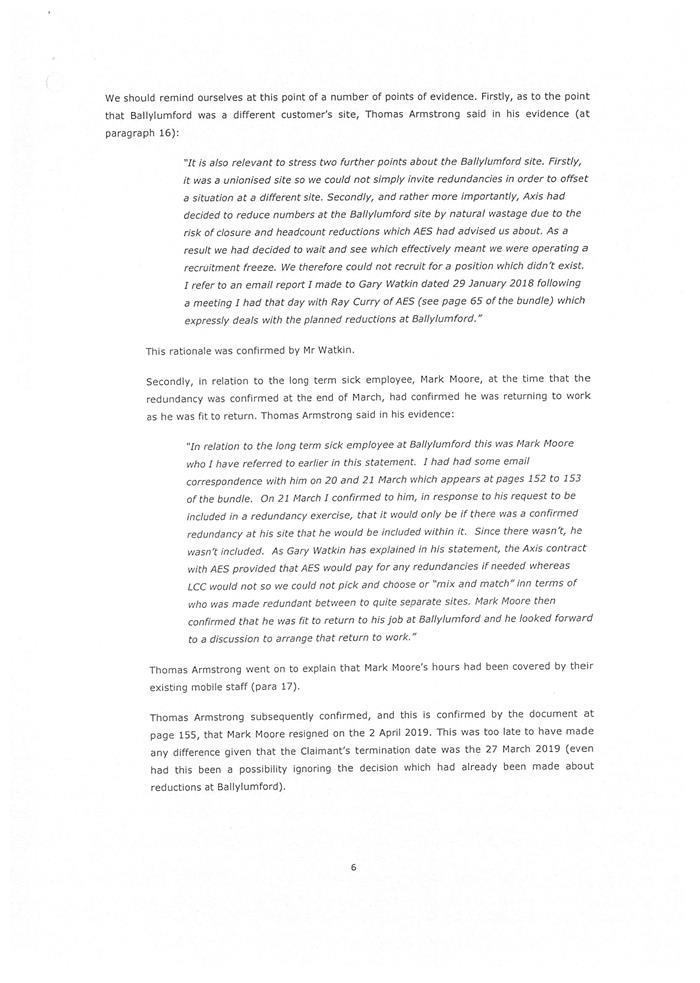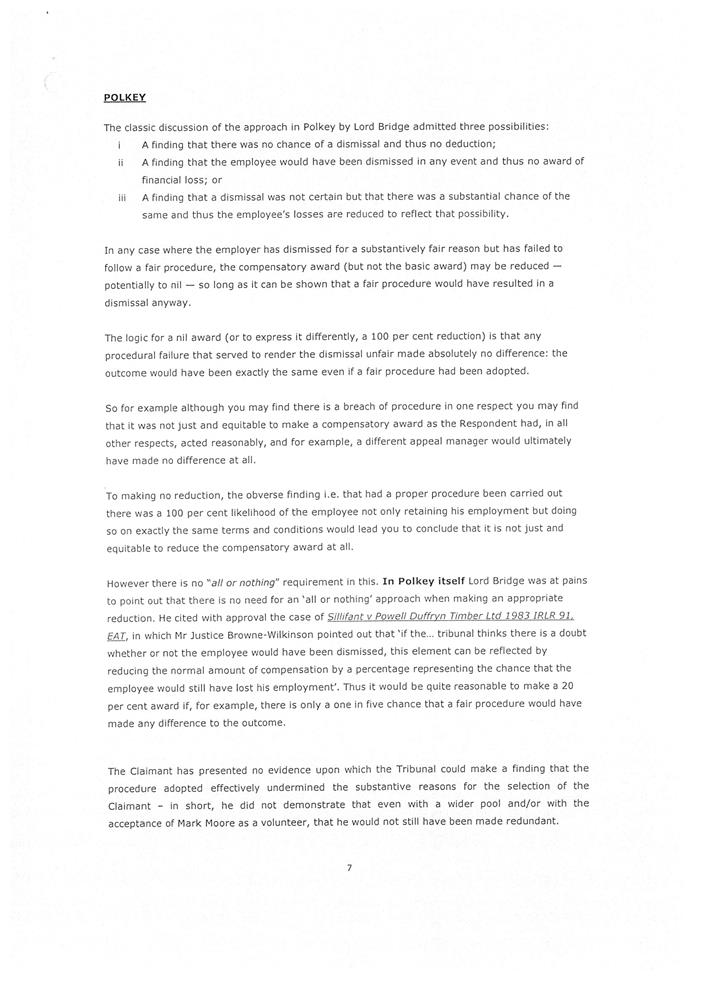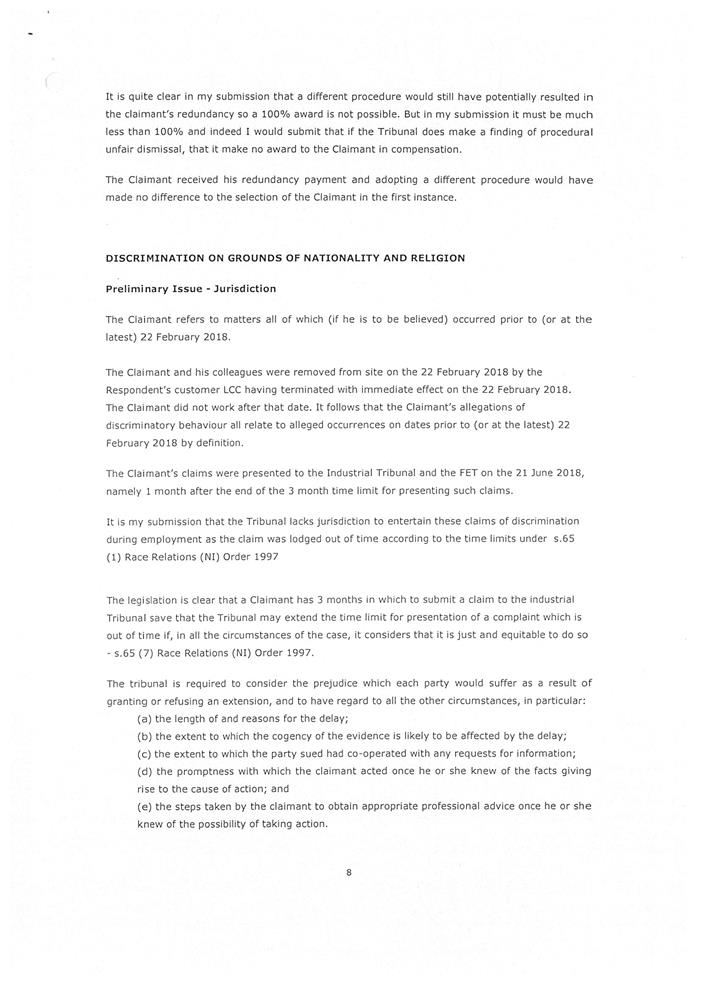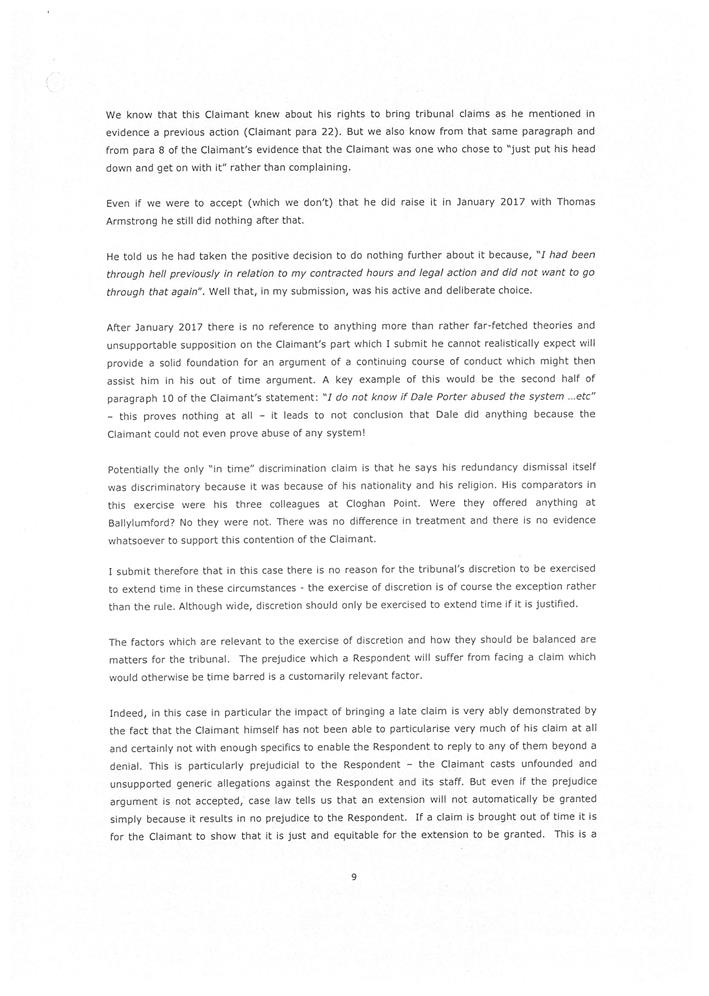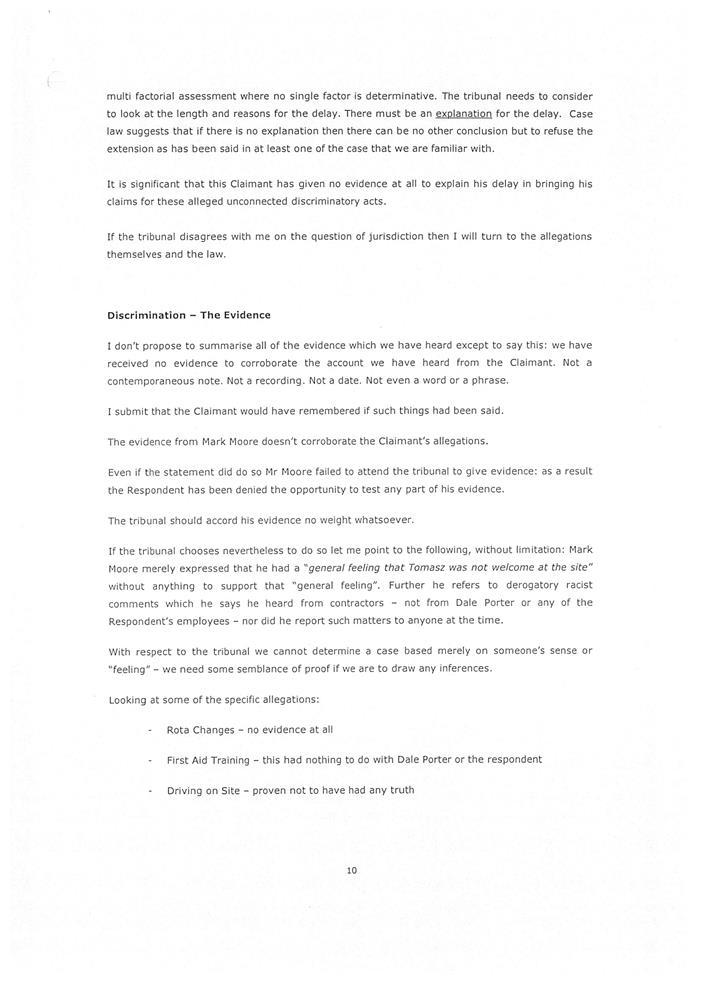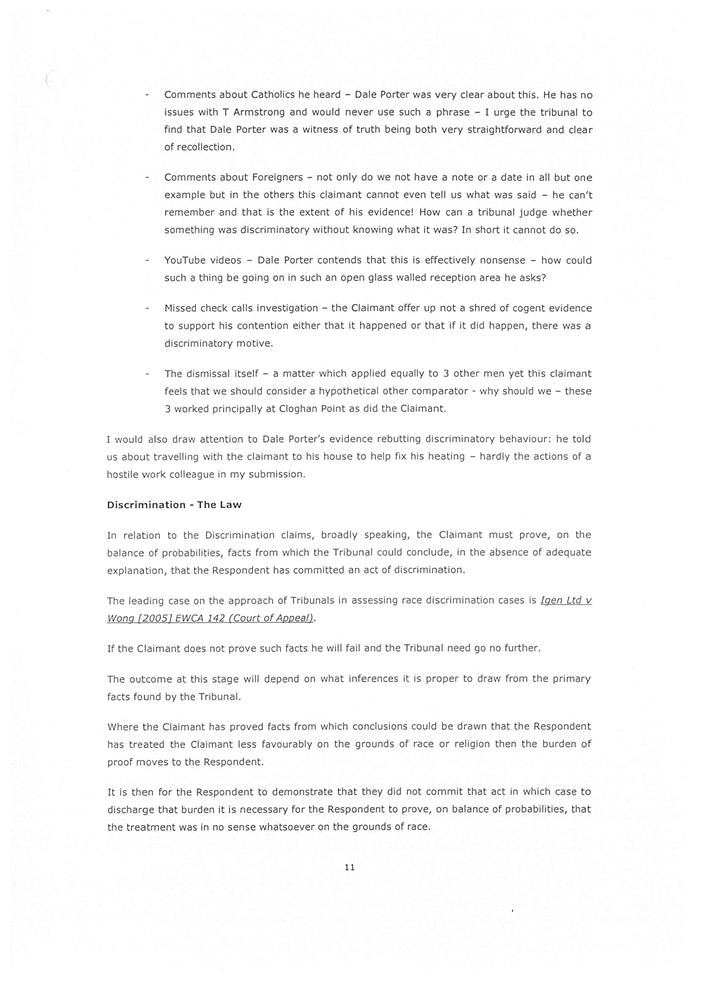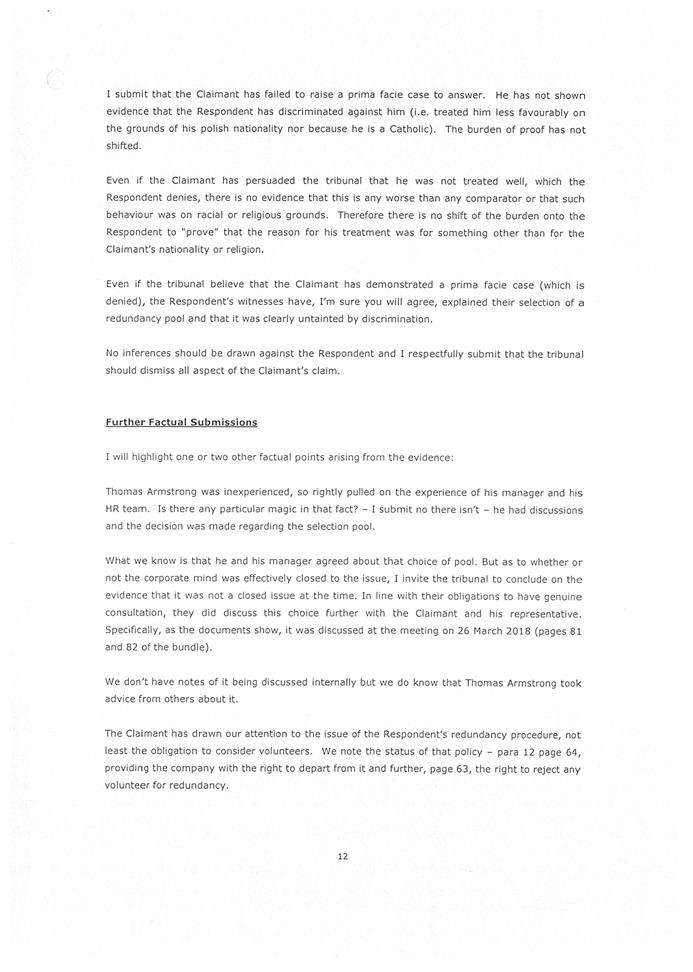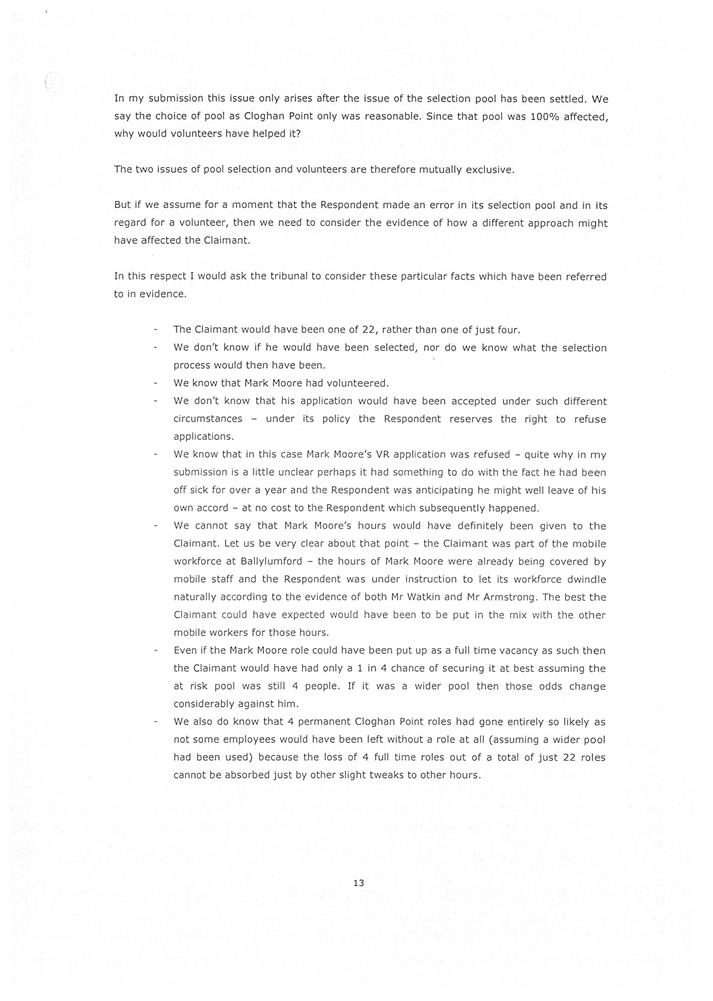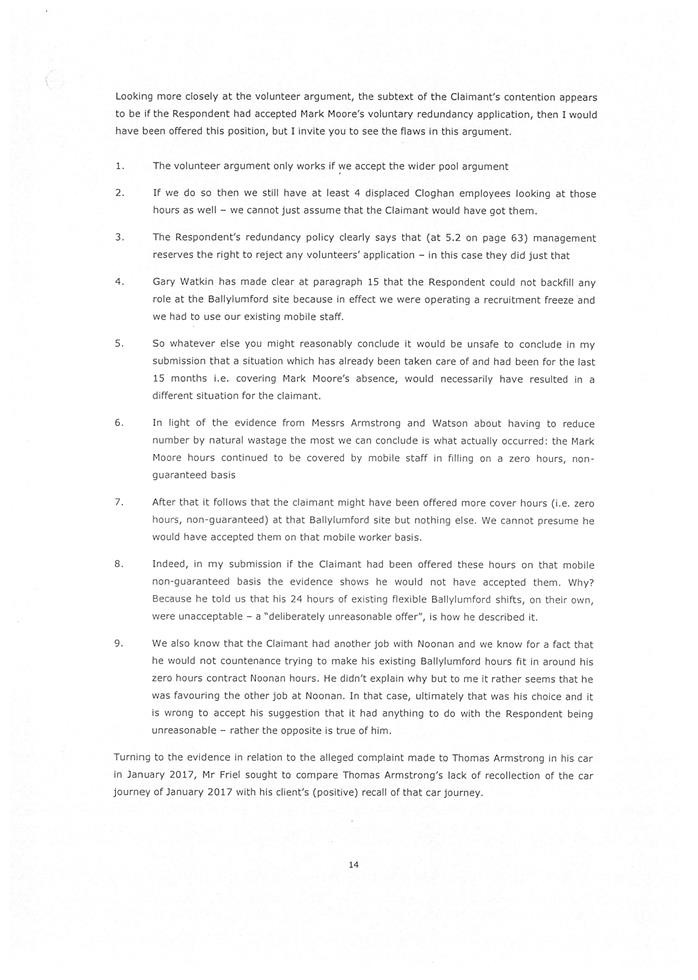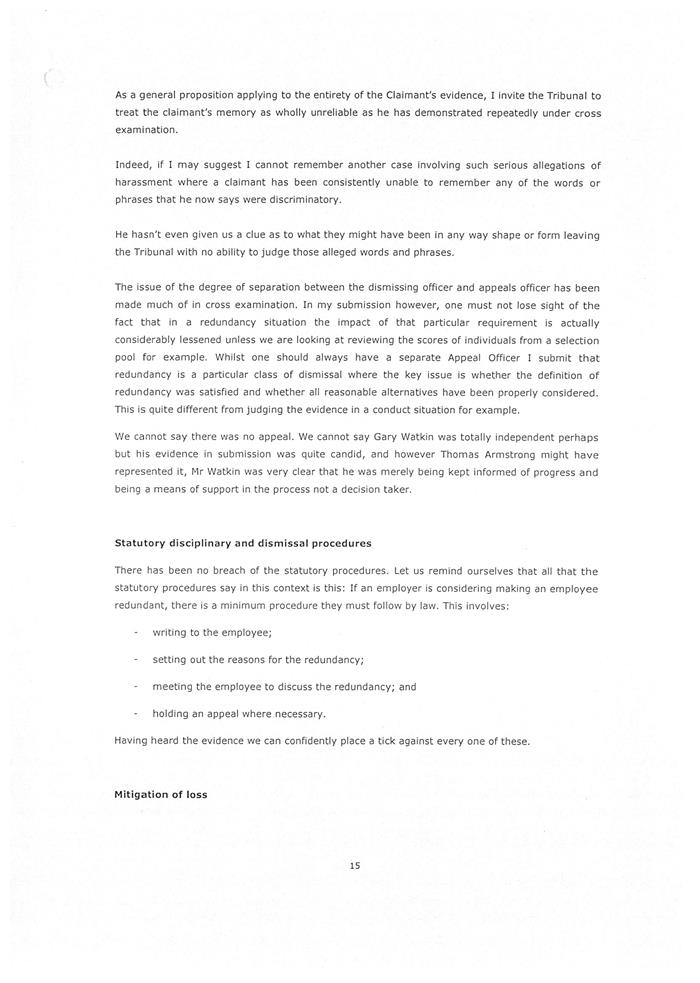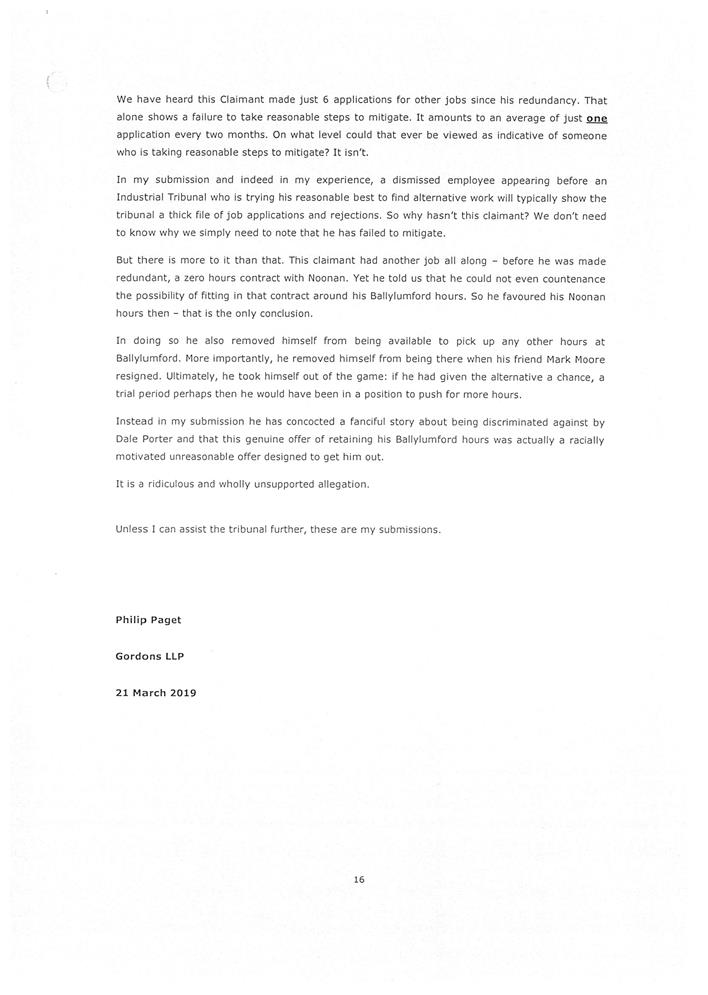Freely Available British and Irish Public Legal Information
[Home] [Databases] [World Law] [Multidatabase Search] [Help] [Feedback]
Fair Employment Tribunal Northern Ireland Decisions
You are here: BAILII >> Databases >> Fair Employment Tribunal Northern Ireland Decisions >> Wasiak v Axis Security Services Ltd (Discrimination - Race Discrimination - Religious Belief/ Political opinion Breach of Contract Unauthorised Deduction of Wages Unfair Dismissal) [2019] NIFET 00076_18FET (23 July 2019)
URL: http://www.bailii.org/nie/cases/NIFET/2019/17425_18FET.html
[New search] [Contents list] [Help]
THE FAIR EMPLOYMENT TRIBUNAL
CASE REFS: 76/18FET
8585/18
CLAIMANT: Tomasz Wasiak
RESPONDENTS: Axis Security Services Ltd
DECISION
The decision of the tribunal is that the claimant was unfairly selected for redundancy and was therefore unfairly dismissed by the respondent. The tribunal further finds that the respondent’s decision to make the claimant redundant was not discriminatory either on the grounds of race or religion. The claimant’s other complaints of discrimination and harassment on the grounds of race and religion are outside the applicable time limit and did not constitute a continuing act or state of affairs. The tribunal is not satisfied that it would be just and equitable to extend time in respect of the elements of the claim that are out of time. The tribunal awards the claimant £1,213.86.
Constitution of Tribunal:
Employment Judge: Employment Judge Wimpress
Members: Mr Barron
Mr McKeown
Appearances:
The claimant was represented by Mr Oisin Friel, barrister at law instructed by Donnelly and Kinder Solicitors.
The respondent was represented by Mr Philip Paget, solicitor, of Gordons LLP.
SOURCES OF EVIDENCE
1. The tribunal received witness statements from the claimant, Mr Gary Watkin, Mr Thomas Armstrong, Mr Dale Porter and heard oral evidence from them by way of cross-examination. The tribunal received a witness statement by Mr Mark Moore who was expected to give evidence on behalf of the claimant but in the event he did not attend the hearing. The tribunal also received two short statements from Mr Charlie Harvey and Mr Jim Glover on behalf of the respondent. The tribunal was provided with a bundle of documents together with a number of additional documents which were produced in the course of the hearing. A substantially revised and agreed schedule of loss was prepared at the request of the tribunal and was submitted as directed within two weeks of the conclusion of the hearing. In addition, the parties’ representatives provided further submissions in relation to loss at the request of the tribunal.
THE CLAIM AND THE RESPONSE
2. The claimant brought claims of unfair dismissal on the basis that he was unfairly selected for redundancy and discrimination on the grounds of race and religious belief/political opinion. He also claimed to be owed amounts in respect of notice pay, for breach of contract and not being paid on Fridays when he was scheduled to work. The claim of discrimination is twofold. Firstly, he claimed that the reason that he was dismissed/selected for redundancy was due to his race, nationality and religious belief. Secondly, he claimed to have suffered from discrimination and harassment on the basis of his race, nationality and religious belief. The claimant set out four examples of his treatment in his claim form as follows:
“(a) The respondent excessively scrutinizing work that the claimant carried out by checking for any “missed calls” and conducting an investigation.
(b) The respondent not offering the claimant extra hours at work compared with colleagues or his contracted hours preferring instead to offer colleagues overtime.
(b) The respondent’s employees altering entries made on his computer during his non-working days to make it appear to the respondent that he was incapable of performing his work to the standard required.
(c) The respondent’s employees using discriminatory language causing the claimant to feel that he was working in a hostile, offensive environment. The claimant contends that colleagues would routinely say the words “fucking fenians” and that they would play YouTube clips of band music that the claimant believes may have come from proscribed organisations. The claimant contends that colleagues would frequently say the words “foreigners coming over here taking our jobs” and “Polish parasites”.
The claim form was dated 18 June 2018 and it was lodged in the tribunal office on 21 June 2018.
3. The respondent filed a detailed response on 3 August 2018. The respondent contended that the claimant was dismissed fairly by reason of redundancy after a full and fair consultation. The response went on to set out the details of the process. The respondent denied all of the allegations of discrimination and denied that he was entitled to the monies claimed by him. The respondent further contended that the tribunal did not have jurisdiction to hear the claims of discrimination as these were lodged out of time as all related to alleged occurrences on dates prior to 22 February 2018 and that it would not be just and equitable to extend the time limit.
4. The respondent subsequently sought additional information in relation to the claimant’s dismissal including who was treated differently and the nature of that different treatment together with further particulars in respect of each of the allegations of discrimination set out at 2(a) to (d) above including details of who was responsible, the dates on which the acts occurred, what investigation took place and comparators.
5. In response to the request for additional information the claimant identified three other workers who had been made redundant – Colin Pauley, Robert McCandless and George Clifford - but contended that unlike them he did not work exclusively at a single site and that the appropriate comparator would be someone who worked at the same site occasionally or regularly but not exclusively who was not of the claimant’s race, nationality or religious belief and that the comparator could be actual or hypothetical. The claimant suggested that Brian McGill, Columb Stanley or others should have been in the selection pool for redundancy. The claimant also put forward Mark Moore as a comparator on the basis that he had requested to be made redundant.
6. In relation to the specific instances of alleged discrimination referred to at 2(a) to (d) above the claimant provided details which may be summarised as follows:
(a) The claimant alleged that the allegation of excessive scrutiny of his work referred to a period from 2013 to December 2016 when Dale Porter was his supervisor at the Ballylumford site and Mr Porter would raise issues that were very minor about how the claimant entered data and others who missed more calls were not investigated. The claimant alleged that he was treated differently from six individuals whom he did not identify and named Stuart Cox as the person who conducted the investigation into missed check calls.
(b) The claimant alleged that he requested overtime on various occasions between 2013 and 2018 and this was refused by Mr Porter and Mr Armstrong. Robert McCandless, Roy Cherry, Mark Moore, Hugh Craig and Charlie Harvey were given overtime and Kristin Callendine was given Mr Moore’s hours when he was off on long-term sick.
(c) The allegation about altered entries arose from the investigation into missed check calls and according to the claimant someone with access to the Time Gate was entering Missed Check Calls on the system that related to the claimant making it appear that he was not checking in when he in fact was.
(d) On 30 or 31 March 2015 Mr Porter checked the LinkedIn profile of Mr Armstrong and what school he attended. Mr Porter said - “he is a fucking fenian. No fucking fenian gonna be telling me how to do Security in this Power Station.”
In addressing this aspect of the request for additional information the claimant repeated some of the contents of his claim form and added a number of new allegations.
(i) Mr Porter ignored the claimant after the claimant had given evidence in support of a grievance by Mr Moore that he had been bullied by Mr Porter. Mr Porter also controlled the rota and thereby ensured that he did not have to work with the claimant.
(ii) On 1 October 2013 Mr Porter refused to pass on the claimant’s driver’s authorisation form to Mr Kitson to ensure that the claimant was able to drive as part of his role. In contrast Mr Cherry’s form was passed on to Mr Kitson when he commenced work in 2015.
(iii) On 30/31 March 2015 Mr Porter checked Mr Armstrong’s LinkedIn profile and what school he attended and stated, “he is a fucking Fenian. No fucking Fenian gonna be telling me how to do Security in this Power Station”.
(iv) In January 2016 Mr Porter remarked that foreigners were coming over and taking the jobs of local people and that Romanians were getting social housing after only arriving in this country and local people had to wait for years.
(v) On 26 January 2017 during a car journey back from the funeral of a colleague the claimant said that he told Mr Armstrong in the context of a discussion about working extra shifts that he would like to work with Mr Glover or Mr Harvey as they were not racist; that Mr Porter and some others were not foreign friendly and that there was an issue on site with racism. According to the claimant Mr Armstrong said that he would speak to Mr Curry but it was not taken forward.
(vi) On 2 April 2018 the respondent failed to offer Mr Moore’s job to the claimant when he resigned despite the claimant requesting it when he was made redundant. Instead it was given to Ms Calladine who was Protestant, had no experience in the security industry, lived on the same estate as Mr Porter and was good friends with him.
(vii) On various dates Mr Porter refused requests made by the claimant for training generally and a First Aid course in particular. Mr Cherry was offered training.
No application was made to amend the claim form and the information provided at (i), (ii) and (vii) might be regarded as going significantly further than the addition of factual details to existing allegations and instead constitute new allegations. However, the respondent did not seek to object to the introduction of these allegations into the claimant’s case and we will therefore proceed on the basis that these matters are encompassed within the claimant’s claim.
THE ISSUES
7. A statement of agreed legal and factual issues was agreed during the case management process. Save for an issue about unlawful deduction of wages which was not pursued the legal issues were agreed as follows:
(1) Was the claimant unfairly dismissed contrary to Article 126 and Article 130 of the Employment Rights (NI) Order 1996 as amended?
(2) Was there a redundancy situation within the respondent’s business as per Article 174 of the Employment Rights (NI) Order 1996?
(3) Did the respondent subject the claimant to discrimination by way of less favourable treatment on the grounds of his race and nationality as defined in Article 3 of the Race Relations (NI) Order 1997?
(4) Did the respondent subject the claimant to discrimination by way of less favourable treatment on the grounds of his religious belief as defined in Article 3 and contrary to Article 19 of the Fair Employment and Treatment (NI) Order 1998?
(5) Who is the claimant’s comparator? Is the comparator an appropriate comparator?
(6) Did the respondent subject the claimant to harassment on the grounds of his race or ethnic or national origin contrary to the Race Relations (NI) Order 1997?
(7) Did the respondent subject the claimant to harassment on the grounds of his religious belief contrary to the Fair Employment and Treatment (NI) Order 1998?
(8) If the claimant is entitled to a remedy, what is the nature of that remedy? Are the relevant tests set out in the relevant case law met for re-instatement, re-engagement or compensation or declaration?
It seems to the tribunal that it is appropriate to add to this two issues that are contained in the accompanying list of factual issues (which we need not recite) which may properly be regarded as legal issues and are of some importance to our decision –
(9) Are any or all of the allegations of discrimination or harassment out of time?
(10) Do the alleged acts of discrimination constitute ongoing acts of discrimination or a “state of affairs” discrimination?
(11) If these claims are out of time does the tribunal have jurisdiction to hear these claims under the “just and equitable” principle?
(12) Did the claimant seek to mitigate his loss? Was the respondent’s offer of partial re-employment reasonable?
(13) Should any deductions be made under Polkey?
THE FACTS
Background to Redundancy
8. The claimant was first employed by Noonan on 26 March 2009 as a security guard. He subsequently moved to the respondent’s employment by a TUPE transfer. The claimant and Mr Porter had known each other for a number of years. Mr Porter helped the claimant with boiler problems at his home when he first moved in and subsequently assisted the claimant when his car broke down.
9. The respondent is a provider of security guard services to a range of commercial, industrial and retail customers. It is based in Central London and is divided into eight regions with four regional offices. Its Human Resources arm is also located in Central London. Mr Watkin was the Regional Manager for the North West which covers four regions including Northern Ireland. The respondent employs approximately 350 staff in Great Britain and Northern Ireland. In Northern Ireland it has a Regional Office at City East Business Centre, 68-72 Newtownards Road, Belfast. At the material time it had a complement of 22 security guards both full time/permanent and mobile posts. In addition, there are four members of staff in management positions. In Northern Ireland the respondent provides security guards to both industrial and retail sites. At the time of the events with which we are concerned the respondent provided this service to three Power Station sites in the Larne area – Cloghan Point, Ballylumford and Kilroot. AES operated the Ballylumford and Kilroot sites. LCC operated the Cloghan Point site.
10. The respondent took over the contract from Noonan Services Group (NI) Ltd (“Noonan”) for the three Power Station sites on 30 March 2015 and the claimant’s contract was transferred to the respondent. The claimant also continued to work for Noonan on a separate contract.
11. In October 2015 a tribunal case (1193/15) brought by the claimant in relation to wages against the respondent and Noonan Services Group (NI) Ltd was settled by way of conciliation with both respondents agreeing to make payments to the claimant.
12. On 23 June 2016 Mr Porter emailed Mr Armstrong about the shifts that he had allocated to Mr Roy Cherry at Ballylumford. Mr Armstrong replied and stated that Mr Cherry might have to drop some of the shifts if he needed them in order to meet the claimant’s contracted hours.
13. On 3 January 2017 the claimant gave evidence at an investigation meeting conducted by Mr Stuart Cox into a grievance raised by Mr Mark Moore arising from a claim that he was being bullied by Mr Porter during work.
14. On 29 January 2018 Mr Armstrong met with Mr Ray Curry of AES who advised him of plans to reduce security cover at Ballylumford which would be phased in between May and July 2018. Mr Armstrong gave uncontested evidence that this reduction in manning would be addressed by natural wastage and meant that the respondent would effectively be operating a recruitment freeze.
15. On 22 February 2018 LCC the owner and operator of the Cloghan Point Power Station site informed Mr Armstrong that it was terminating its contract with the respondent and that staff on site should be removed immediately. The respondent hoped that staff employed at the site would be taken on by the new contractor via a TUPE transfer and a course of correspondence ensued in which the respondent sought unsuccessfully to press this point on LCC. In parallel with this Mr Armstrong discussed the need to consider redundancies with the respondent’s Human Resources Department.
16. The respondent had a Redundancy Policy which was promulgated in 2017. Section 3 of the policy is headed “ Avoiding Redundancies” and reads as follows:
“3.1 The Company will endeavour to explore all alternatives to avoid redundancies although it may not always be possible. However, it will consider alternatives to avoid compulsory redundancies. Measures to avoid compulsory redundancies may include the following:
· Seeking volunteers for voluntary redundancy;
· Redeployment and, if possible, retraining to other parts of the organisation;
· Reduction or elimination of overtime working;
· Restrictions on recruitment;
· Considering volunteers for part-time working;
· Short time working;
· Trying to make savings in other areas.”
Section 4 of the policy addressed Selection Methods as follows:
“4.1 The Company will ensure that it will act in accordance with legislation and best practice, and will maintain a balanced, skilled and experienced workforce after any redundancies which occur and it recognises that it is paramount that individuals who have been selected for redundancy will normally be selected using the merit criterion, taking into account disciplinary and attendance records where appropriate.
4.2 The precise selection criteria will vary according to each redundancy situation but the below indicate the types of criteria which we may wish to apply.”
Section 5 then sets out the procedure to be followed in selecting for redundancy as follows:
“5.1 Wherever appropriate, we will consider the option of inviting volunteers for redundancy in order to avoid or reduce compulsory redundancies that may otherwise be required. On occasions, due to financial or time constraints, the seeking of volunteers for redundancy may not be a viable option open to us.
5.2 Consideration of applications must take into account the needs of the business and volunteers who are not essential for the continued running will receive priority consideration. Management reserves the right to reject any volunteer’s application.
5.3 The selection criteria may include some or all of the following (although this is non-exhaustive)
· attendance record
· disciplinary record
· skills, competencies and qualifications
· performance records
5.4 If attendance records are to be used as part of the selection criteria, the Company will carefully assess the reasons for and extent of absences. Absences relating to pregnancy, maternity, paternity, parental and adoption leave and sick leave relating to a disability, will be discounted. Any absences agreed by us (e.g. unpaid leave, compassionate leave) will also be discounted.”
17. On 23 February 2018 Mr Armstrong sent an email to the claimant and the other three employees on the site to which he attached an “Announcement of Proposed Redundancies” which read as follows:
“Due to a reduction in hours at LCC Cloghan Point, rotas have to be rebalanced and this might result in a redundancy situation.
This inevitably suggests that we must consider making 4 jobs redundant in the following categories
JOB TITLE - Security Officer
Part time Security Officer
As soon as we are able we will inform those employees who initially may be affected by the proposals and consult with them.
We anticipate at this stage that redundancies would take place no later than 02/03/18.
I am sorry to have to make this announcement and assure you that we will proceed as diligently and sensitively as we are able.
If you have any queries about this situation please contact
Thomas Armstrong Operations Manager.”
18. On 26 February 2018 Mr Armstrong emailed the claimant a letter inviting him to attend a consultation meeting on 28 February 2018. The letter explained that the reason for the redundancy situation was LCC’s decision to terminate its contract with Axis Security with immediate effect from Thursday 22 February 2018. The letter further advised that they would discuss the method by which the claimant could be selected for redundancy and that he would be invited to consider any counter proposals that the respondent had and submit his views at the meeting and that they would also discuss the possibility of providing an alternative job. Mr Armstrong further advised that during the period of individual consultation they would consider all ideas, suggestions and representations that he wished to make and that a further consultation meeting would be held on 7 March 2018.
19. The consultation meeting proceeded as arranged on 28 February 2018 with Mr Armstrong and Mr Cox in attendance. Mr Armstrong again explained why the claimant had been selected for possible redundancy namely that LCC had terminated the contract without any reason and removed all of the respondent’s employees from the site. Mr Armstrong advised that the respondent was looking into the possibility of alternative work to try to avoid redundancies completely and the claimant replied that he had a 48 hour contract with the respondent. Mr Armstrong asked the claimant whether he would consider 48 hours per week on the same site if they could get it for him and the claimant said that he would see what happens and that he would consider a full time position at AES Ballylumford. Mr Armstrong did not reply directly but stated that security officers were the respondent’s responsibility and that he would continue to be paid until he was either redeployed or made redundant. Mr Armstrong advised how the respondent would help the claimant if he was made redundant. The claimant was then given the opportunity to raise any matters. The claimant told Mr Armstrong that he could not pay him off for 24 hours and expect the claimant to make himself available 7 days a week waiting on the other 24 hours and pointed out that he did not have set shifts at AES Ballylumford.
20. The further meeting which was due to take place on 7 March 2018 was, in the event, put back to 19 March 2018. On this occasion the claimant was accompanied by his trade union representative, Mr McMurray. Mr Michael Antill attended as the company witness/note taker. Following the introductions Mr McMurray asked why the claimant could not have the long term sick post [Mr Moore]; where was the scoring matrix and why was the claimant being made redundant. Mr Antill replied and said that they were not prepared to discuss other employees’ cases with him concerning long term sick but that he could confirm that there was no long-term sick cover role. Mr Antill further stated that there was not a scoring matrix as there were no jobs to offer as suitable alternatives and all four positions were at risk on this contract as the site had closed with immediate effect. The claimant was in the pool as he had worked on the site for years and it was a substantial chunk of his contract. The claimant and Mr McMurray raised concerns about the process in particular the absence of a scoring matrix and the respondent’s failure to offer the claimant suitable alternative employment. The claimant asked whether he had been selected for redundancy because he had raised a health and safety concern about water. Mr Armstrong replied that he wasn’t and that the water issue had been resolved. Mr Armstrong then stated that the claimant had said “No” to their offer of the option of redundancy for 24 hours of his contract and to carry on working for the respondent for 24 hours. The claimant denied doing so and Mr Armstrong referred him back to the minutes of the last meeting. Mr McMurray asked about the offer and Mr Antill explained it to him and reiterated that it had been refused by the claimant. Mr Antill indicated that they were happy to make the offer again if things had changed as it was their intention to do everything to keep their employee employed. The claimant asked about pay and Mr Antill replied that it would be about half the £5,000 that the claimant had been offered as a possible redundancy figure. The meeting was adjourned for a short period to allow the claimant and Mr McMurray to consider this. When the meeting resumed fifteen minutes later Mr McMurray sought further details of the figures if the claimant went for 24/24 and Mr Antill agreed to provide worked examples and then return for another meeting on 26 March. Mr McMurray asked what other actions had been taken to avoid redundancy and Mr Antill indicated that they had looked at redeployment and all other options available but unfortunately there was nothing. Mr McMurray then asked about voluntary redundancy and Mr Antill replied that they had been chasing the old client to avoid redundancy as they believed that it was a TUPE situation but that it was denying TUPE and the respondent was trying to do the best for these employees.
21. On 20 March 2018 Mr Armstrong sent the claimant the figures for a full redundancy and part redundancy if the claimant chose to remain employed by the respondent as a Security Officer on 24 hours on AES sites. Mr Armstrong explained that this would constitute an offer of alternative employment and would be subject to a 28 day trial period.
22. Also on 20 March 2018 Mr Armstrong wrote to the claimant and invited him to a formal meeting on 26 March 2018. Mr Armstrong informed the claimant that the purpose of the meeting was to conclude the consultation with him over his position being at risk of redundancy. Mr Armstrong stated that having considered the claimant’s counter proposals and investigated the possibility of alternative employment it now appeared that they were moving closer to the conclusion of the consultation period and that the meeting may result in the termination of his employment. Mr Armstrong further advised the claimant that he was entitled to be accompanied by a colleague or an accredited trade union official.
23. On 20 March 2018 at 9.48 pm Mr Moore emailed Mr Armstrong and said that if the respondent was not going to be able to honour him coming back to Ballylumford would it be possible for him to be included in any redundancies that are due to take place. On 21 March 2018 Mr Armstrong replied that if there was confirmed redundancy at this site (which there was not) he would be treated exactly the same as everyone else. Mr Moore replied a short time later and advised that as he was no longer on sickness benefits and had been declared fit to work he could return to his job at Ballylumford at any convenient time.
24. The formal redundancy meeting between Mr Armstrong and the claimant took place as arranged on 26 March 2018 (11.05 am to 11.40 pm). The claimant was again represented by Mr McMurray. Mr Armstrong was accompanied by Soaham Varkapshreeam in the role of company witness/notetaker. The points discussed were as follows:
(i) In relation to the long term sick position Mr McMurray advised that they had been told that this employee would not be returning. Mr Armstrong replied that he could not discuss another employee but that this information was incorrect.
(ii) The claimant asked whether Mr Armstrong could get him work over the weekend so that he could get a job from Monday to Friday. Mr Armstrong replied that he would have a look but that currently he could only offer one five hour retail shift every Sunday. The claimant indicated that he was not interested in the retail work offer as its location did not make it cost effective for him. Mr Armstrong replied that he could not guarantee weekend work elsewhere.
(iii) The claimant asked whether the respondent was making people working on other sites redundant. Mr Varkapshreeam responded that as the claimant worked for the majority of his time on the LCC site which had been lost he was in line for redundancy. Mr McMurray questioned the failure to use a matrix and Mr Varkapshreeam answered that everyone that worked on the LCC site was at risk of redundancy. The claimant asserted that he had worked over three sites but could not produce evidence of it. Mr McMurray further queried not putting everyone at Belfast at risk and Mr Varkapshreeam replied that they had never done that and that the claimant was at risk because the bulk of his work was on the LCC site. Mr Armstrong then confirmed that during his two years as Operations Manager the claimant had only worked at AES Ballylumford and Cloghan Point.
(iv) Finally, the partial redundancy offer was dealt with. The claimant said that he had seen the figures and was not interested. Mr Armstrong replied that he then had no option but to make the claimant redundant as of 27 March 2018.
The meeting concluded with a brief exchange about the mechanics of making the redundancy payment and Mr Armstrong reiterated that they still believed that it was a TUPE situation and were doing their best to avoid redundancies.
25. On 26 March 2018 at 12.57 pm Mr Moore forwarded his email of 21 March [to Mr Armstrong] to the claimant.
26. On 27 March 2018 Mr Armstrong wrote to the claimant and informed him that he had been selected for redundancy. Mr Armstrong provided a schedule which set in detail how the claimant's redundancy payment was being calculated which amounted to £3,520.80. The claimant was also to receive 9 weeks’ notice pay which was the same amount making a total payment of £7,041.60. Mr Armstrong further advised the claimant of his right to appeal against the decision to the Senior Regional manager, Mr Watkin, within 7 days.
27. On 2 April 2018 Mr Moore emailed Mr Armstrong and gave notice of his resignation as of that date. He informed Mr Armstrong that he had been advised by his GP against going back into an environment where there was an active bully in a position of power due to the risks associated to this type of person as he suffered health issues because of Dale Porter.
28. On 3 April 2018 Mr Cox replied to Mr Moore’s email and indicated that the respondent would like him to take a cooling off period of 48 hours to consider his resignation as he had raised welfare issues and that the respondent might be able to amend his duties or investigate the issues that he had raised to help him return to work through a welfare meeting. Mr Cox further stated that although Mr Moore’s resignation was not in line with contractual requirements it would be accepted if the respondent did not hear from him by 5 April 2018 at 5.00 pm.
29. On 4 April 2018 the claimant exercised his right of appeal against the decision to make him redundant and submitted an appeal to Mr Watkin.
30. An appeal meeting was convened on 16 May 2018. The claimant was again accompanied by Mr McMurray. Mr Armstrong was in attendance and was responsible for taking a note of the meeting. Mr Armstrong also provided information where necessary. Mr McMurray suggested that around the time of the redundancy decision an employee [Mr Moore] was on long term sick leave and did not intend to return to work which left a full time post vacant. Mr Armstrong advised that the employee in question had communicated an intention to return and hence there was no post available. Mr McMurray disputed this and Mr Watkin indicated that he expected a decision to be made by personnel based on the facts at the time. Mr Watkin then asked the claimant to present his appeal. Mr McMurray stated that the claimant and the Union felt that the selection process was unfair in that there was no selection criteria; no option for wider staff to take voluntary redundancy and no job share offers were explored. They both also stated that the decision was made because the claimant did not fit the required profile being Eastern European and Catholic which was described as an allegation of racial discrimination. Mr Watkin asked whether this allegation was directed at regional management or site personnel and the claimant replied that it was directed against site personnel. Mr Watkin responded that redundancy decisions were not made by site personnel. The claimant went on to state that further evidence of unfair treatment was the respondent’s approach to welfare check calls. Mr McMurray then requested an adjournment and when the meeting resumed a few minutes later the claimant provided further details about missed check and suggested that data was manipulated to make him look bad. Mr Watkin explained why he disagreed with this suggestion. The claimant added that others were offered overtime but he was not. The meeting concluded shortly afterwards with Mr Wadkin stating that he would review the case presented and give his decision at the earliest opportunity.
31. On 18 June 2018 Mr Watkin wrote to the claimant and advised that his appeal had been unsuccessful. In so deciding Mr Watkin made the following findings:
“1. The process for criteria for selection was reviewed and deemed to be fair and consistent across the business.
2. There is no evidence to support the claim that the selection process was unfair, specifically in regards to racial or religious discrimination. Axis Security are an equal opportunities employer.”
32. The claimant made six unsuccessful applications for other jobs following his redundancy while availing of increased hours for his second employer, Noonan. Ultimately the claimant secured alternative employment at an equivalent rate of pay on 20 December 2018 and subsequently secured a job at a higher rate of pay in March 2019. Accordingly his period of loss ended on 20 December 2018 a period of 38 weeks.
Discrimination and Harassment
33. The allegations which give rise to the claimant’s discrimination/harassment claim are set out below. These are recorded in the order in which they appear in the claimant’s witness statement. Some are dated – others are not. We have also included the respondent’s position in relation to each as appears from the evidence that we have received.
(i) The claimant’s supervisor, Mr Porter took a particular dislike to the claimant on the basis that he was Polish and Catholic. Mr Porter denied this and claimed that he had a good relationship with the claimant. Mr Porter also gave evidence of having helped the claimant with a boiler problem when he ran out of oil shortly after he moved into his house and also assisted him a few times when his car broke down.
(ii) 1 October 2013 – Mr Porter refused to pass on the claimant’s driver’s authorisation to Mr Kitson whereas Mr Cherry’s authorisation was passed on immediately when he started work in 2015. Mr Porter agreed that he received this document from the claimant but passed it on to the HR Department and asked whether the claimant could drive on site on the basis of his Polish driving licence. Mr Porter was advised that the claimant could not drive without a Northern Ireland licence. Once the claimant obtained a licence the authorisation was processed in the normal way. Mr Cherry already had a Northern Ireland licence so there was no issue in his case.
(iii) Undated - Mr Porter made comments about Catholics and it was clear to the claimant that Mr Porter regarded any Catholic as less than him. Mr Porter also made comments that were disrespectful to Eastern Europeans or people who he described as foreigners. Mr Porter’s evidence was that this was completely untrue and that he had never made any comments that were disrespectful to Europeans or described people as foreigners.
(iv) On 30/31 March 2015 Mr Porter is alleged to have checked Mr Armstrong’s LinkedIn profile and what school he attended and stated, “he is a fucking Fenian. No fucking Fenian gonna be telling me how to do Security in this Power Station”. Mr Porter denied checking Mr Armstrong’s LinkedIn profile or using the words attributed to him and claimed that he never had any issue with Mr Armstrong. The claimant did not understand what the word ‘fenian’ meant and had to google it.
(v) January 2016 - The claimant alleged that Mr Porter had said that “foreigners were coming over here and taking the jobs of local people” and that “Romanians were getting social housing after only arriving in the country and local people had to wait for years”. According to the claimant a scaffolding contractor who was friendly with Mr Porter mocked the claimant’s accent and they would both laugh at him leaving him feeling upset and embarrassed. Mr Porter agreed that there was a scaffolder whom he would speak to when he passed by in the morning but denied that he commented on the claimant’s accent and that they laughed at him. Mr Porter also denied making comments about foreigners or Romanians. Mr Porter’s evidence regarding this and other similar allegations was that the claimant had given false evidence and was making Mr Porter out to be a different person than he was.
(vi) 26 January 2017 – During a car journey back from the funeral of a work colleague Mr Armstrong asked the claimant if he wanted to work shifts at Ballylumford. The claimant understood that this was to cover Mr Moore’s absence. The claimant said that he would like to do this but would like to work with James Glover or Charlie Harvey as they had wives or girlfriends from foreign countries and were not racist. According to the claimant he told Mr Armstrong that Mr Porter and some others were not foreign friendly and there was an issue on site with racism. Mr Armstrong told him that he would speak to Mr Ray Curry about it but he never heard anything back. Mr Armstrong gave evidence that the claimant had never raised any issue with him about racist and religious harassment by Porter either during the car journey or at monthly reviews. If this had been raised with him Mr Armstrong would have investigated it. Mr Armstrong recalled the car journey in question and having a discussion with the claimant about taking over Mr Moore’s shifts at Ballylumford and that if the claimant was interested he would have to take over all of the hours and not just some which would mean giving up all of his hours at Cloghan Point. The claimant did not want to do this and no further conversation ensued. Mr Armstrong specifically denied that the claimant mentioned racism or said that he would like to work with Mr Glover or Mr Harvey or that he said that he would get back to the claimant after speaking to Mr Curry.
(vii) Undated – The claimant alleged that Mr Porter refused the claimant’s requests to go on first aid courses. Mr Porter maintained that he had nothing to do with who went on such courses. On the first occasion on which it was offered AES paid the full hour shift time that was missed and Mr Porter and two colleagues attended. The second time that it was offered nobody took up the opportunity because only 8 hours paid shift time was offered.
(viii) 3 January 2017 – The claimant gave evidence in support of Mr Moore’s grievance against Mr Porter about bullying and discrimination on the basis of sexual orientation and thereafter Mr Porter ignored the claimant and controlled shifts to avoid working with him. Mr Porter denied treating the claimant differently after the investigation and denied controlling or changing the rota.
(ix) 2013 to December 2016 – Excessive scrutiny of claimant’s work by Mr Porter. Mr Porter’s job as a supervisor involved scrutinising the work of employees that he was responsible for. He noticed that the claimant made more mistakes than others when entering the names of visitors into the system which he thought was down to the language barrier. Mr Porter therefore did check the claimant’s entries more carefully than others and advised the claimant to avoid the problem by getting visitors to write down their names for him to enter. Mr Porter also pulled the claimant up because his attitude and tone towards visitors was arrogant or rude. Mr Porter claimed that he would have treated anyone who behaved this way in the same manner.
(x) 2013 to 2018 – Refusal of overtime by Mr Porter and Mr Armstrong. Mr Porter in his witness statement explained how the allocation of overtime worked. Overtime was first offered to full-time guards on the site and if they did not want the overtime it was offered to mobile staff via Mr Armstrong. Mr Porter accepted that Kristin Calladine did many of Mr Moore’s hours when he was off sick as did other mobile staff. Mr Armstrong in his witness statement agreed with Mr Porter’s explanation as to how overtime operated.
(xi) January 2018 - The claimant was investigated for having missed check calls. The respondent operated a system at the Cloghan Point site whereby security staff call to say that they are at their post and everything is ok. It is not a matter of dispute that the claimant was investigated in respect of missed calls on 4 and 5 October 2017, 6 December 2017 and 11 January 2018. The claimant believed that other staff with more missed calls were not investigated and believed that he was treated differently because of his religion and race/nationality. The claimant did not identify anyone who was treated more favourably than him and the crux of this aspect of the claimant’s case was how Mr Porter is alleged to have treated him. In his witness statement the claimant stated – “I do not know whether Dale Porter abused the system or not to get me into trouble with the respondent however I do genuinely believe that if he did not do it himself he got someone else to do it.” The claimant also alleged that he was blamed by Mr Porter for changing entries on the time gate system in relation to missed calls. The claimant attended an investigation meeting on 20 January 2018 with Mr Stuart Cox at which he gave an explanation for the missed calls and voiced his suspicions about Mr Porter. No further action was taken against the claimant. In his witness statement Mr Porter made the point that he worked on the Ballylumford site which did not operate a checked calls system and he therefore did not deal with missed check calls and that the system operated at Cloghan Point only applies to night shift workers. Mr Porter did not work nights and the only entries that he made on the time gate system were in relation to the names of staff who had been allocated to each shift. Mr Porter also denied changing entries on the time gate system in relation to missed calls.
(xii) According to the claimant around this time he saw Mr Porter and some colleagues who were friends of his driving past his house and sitting outside his house. The claimant felt that Mr Porter was trying to intimidate him. In his witness statement the claimant also makes reference to a specific occasion in August 2018 when he claims to have seen Mr Porter sitting outside his house in a car. The car was not the one used by Mr Porter to drive to work and the claimant believed that it belonged to a customer of Mr Porter who worked as a part-time mechanic. In view of the events with which these proceedings are concerned we believe that the claimant intended to refer to August 2017 rather than August 2018. In his witness statement Mr Porter refuted the allegation that he had deliberately driven past the claimant’s house, sat outside his house or tried to intimidate him. Mr Porter knew where the claimant lived and would have occasionally driven past it on his way to visit a Mr Swan to fix the wheels on his son’s BMX bike. According to Mr Porter the best way to get to Mr Swan’s house is by following a route that goes past the claimant’s house. We were shown maps of the area showing an alternative and on one view easier route.
(xiii) Various dates – Routine use of offensive language and playing of band music. In his witness statement the claimant alleged that at the Ballylumford site staff would play You Tube videos of band music played by paramilitary groups like the UDA which was designed to make him as a Catholic feel uncomfortable. In oral evidence the claimant specifically accused Mr Porter of playing such music and switching it off if anyone came in. Mr Porter described such behaviour as totally unacceptable and denied that it ever happened. Mr Porter described the general reception area where he was stationed as like being on display in a goldfish bowl and that such behaviour would not happen in that environment. Photographs of the reception area were produced in support of this contention.
(xiv) 22 February 2018 - Mr Armstrong informed the claimant that he was at risk of redundancy. The allegation of discrimination was refuted by Mr Armstrong.
(xv) 2 April 2018 – Mr Moore resigned on this date and the respondent failed to offer his job to the claimant. The allegation of discrimination was refuted by Mr Armstrong.
(xvi) 18 June 2018 – Mr Watkin affirmed on appeal the decision to make the claimant redundant. There was no specific allegation of discrimination by Mr Watkin in relation to the appeal.
RELEVANT LAW
Redundancy
34. Article 130 of the Employment Rights (Northern Ireland) Order 1996 (“the 1996 Order”) provides that:-
“(1) In determining for the purposes of this Part whether the dismissal of an employee is fair or unfair, it is for the employer to show –
(a) the reasons (or, if more than one, the principal reason) for the dismissal, and
(b) that it is either a reason falling within Paragraph (2) or some other substantial reason of a kind such as to justify the dismissal of an employee holding the position which the employee held.
(2) A reason falls within this paragraph if it –
...
(c) is that the employee was redundant,
...
(4) Where the employer has fulfilled the requirements of paragraph (1), the determination of the question whether the dismissal is fair or unfair (having regard to the reason shown by the employer) –
(a) depends on whether in the circumstances (including the size and administrative resources of the employer’s undertaking) the employer acted reasonably or unreasonably in treating it as a sufficient reason for dismissing the employee, and
(b) shall be determined in accordance with equity and the substantial merits of the case.”
35. A redundancy is defined in Article 174 of the 1996 Order as follows:
“174(1) For the purposes of this Order an employee who is dismissed shall be taken to be dismissed by reason of redundancy if the dismissal is wholly or mainly attributable to –
(a) the fact that his employer has ceased or intends to cease –
(i) to carry on the business for the purposes of which the employee was employed by him, or
(ii) to carry on that business in the place where the employee was so employed, or
(b) the fact that the requirements of that business –
(i) for employees to carry out work of a particular kind,
or
(ii) for employees to carry out work of a particular kind in the place where the employee was employed by the employer, have ceased or diminished or are expected to cease or diminish.”
36. Article 130A of the 1996 Order is concerned with the procedural fairness of dismissals. Employees are regarded as unfairly dismissed if the statutory dismissal procedure was not complied with and the failure to comply was attributable to the employer. By Article 130A (1) of the 1996 Order where the statutory dismissal procedure is applicable in any case and the employer is responsible for non-completion of that procedure, the dismissal is automatically unfair. A tribunal is required to consider whether the dismissal is automatically unfair under Article 130A even where this issue has not been specifically raised by the claimant - see Venniri v Autodex Ltd (EAT 0436/07).
37. When considering the termination of any employment the employer must follow the appropriate procedure in respect of disciplinary and dismissal set out in Schedule 1 Part 1 of the Employment (Northern Ireland) Order 2003. The standard procedure applies in the present case and paraphrasing the procedure for a redundancy dismissal its requirements are as follows:
“(i) The employer must set out in writing the circumstances which lead him to contemplate dismissing the employee as redundant, and must send a copy to the claimant and invite the employee to a meeting to discuss it.
(ii) There must be a meeting. The employee must be told of the decision and of his right to appeal.
(iii) If the employee wishes to appeal, there must be an appeal meeting and the employee must be told of the decision.”
38. Article 17 of the Employment (Northern Ireland) Order 2003 (‘the 2003 Order’) provides for adjustment of awards made by industrial tribunals where the claim relates to any of the jurisdictions listed in Schedule 2 of that Order. Unfair dismissals are included in that Schedule. Where a tribunal finds that a failure to complete the statutory procedure is attributable to failure by the employer, it may increase any award it makes to the employee by between 10% to 50% if the tribunal considers it just and equitable in all the circumstances to do so unless there are exceptional circumstances which would make an increase of that percentage unjust or inequitable. This only applies to the compensatory award. Similarly, if the employee fails to complete the statutory procedure, comply with its requirements or exercise a right of appeal a tribunal may reduce any award which it makes to the employee by 10%, and may, if it considers it just and equitable in all the circumstances to do so, reduce it by a further amount, but not so as to make a total reduction of more than 50%.
39. The Employment Appeal Tribunal in Williams v Compair Maxam Ltd [1982] ICR 156 listed the principles which, in general, reasonable employers adopt when dismissing for redundancy employees who are represented by independent trade unions. Those principles can be adapted where the employee is not represented by a recognised trade union. They are as follows:-
2. The employer will consult the union as to the best means by which the desired management result can be achieved fairly and with as little hardship to the employees as possible. In particular, the employer will seek to agree with the union the criteria to be applied in selecting the employees to be made redundant. When a selection has been made, the employer will consider with the union whether the selection has been made in accordance with those criteria.
3. Whether or not an agreement as to the criteria to be adopted has been agreed with the union, the employer will seek to establish criteria for selection which so far as possible do not depend solely upon the opinion of the person making the selection but can be objectively checked against such things as attendance record, efficiency at the job, experience, or length of service.
4. The employer will seek to ensure that the selection is made fairly in accordance with these criteria and will consider any representations the union may make as to such selection.
5. The employer will seek to see whether instead of dismissing an employee he could offer him alternative employment.”
40. These guidelines were expressly approved in Robinson v Carrickfergus Borough Council [1983] IRLR 122, a decision of the Northern Ireland Court of Appeal.
41. In Langston v Cranfield University [1998] IRLR 172, the Employment Appeal Tribunal held that, so fundamental are the requirements of selection, consultation and seeking alternative employment in a redundancy case, they will be treated as being an issue in every redundancy unfair dismissal case.
42. In the Employment Appeal Tribunal in the case of Halpin v Sandpiper Books Ltd [2012] UKEAT/0171/11 confirmed that the correct approach to dealing with redundancies is set out in Williams v Compair Maxam Ltd [1982] IRLR 83. It also confirmed that decisions as to pools and criteria are matters for management and rarely will it be for an employment tribunal to interfere with any such decisions.
43. In Taymech v Ryan [UKEAT/0663/94], Mummery J, as he then was, said on the issue of the basis of the pool for selection:-
“There is no legal requirement that a pool should be limited to employees doing the same or similar work. The question of how a pool should be defined is primarily a matter for the employer to determine. It would be difficult for the employee to challenge it, where the employer has genuinely applied his mind to the problem.”
44. In Capita Hartshead Ltd v Byard [UKEAT/0445/12] it was held:-
“(d) the Employment Tribunal is entitled, if not obliged, to consider with care and scrutinise carefully the reasoning of the employer to determine if he has ‘genuinely applied’ his mind to the issue of who should be in the pool for consideration for redundancy; and that
(e) even if the employer has genuinely applied his mind to the issue of who should be in the pool for consideration for redundancy, then it will be difficult, but not impossible, for an employee to challenge it.”
45. A tribunal is not entitled to substitute its view for that of an employer, who has genuinely applied his mind to the said issue (see further Family Mosaic Housing Association v Badman [UKEAT/10042/13]).
46. In Fulcrum Pharma (Europe) Ltd v Bonassera [UKEAT/0198/10] there was no criticism of the management decision to have a pool of two, the employer’s failure related to the failure to consult on the size of the pool. Similarly, in Halpin v Sandpiper Books Ltd since the claimant was the only employee based in China, the respondent’s decision to make the post redundant was correctly based ‘on a pool of one’.
47. In Polkey v AE Dayton Services Ltd [1988] ICR 142 the Court stated:-
“In the case of redundancy, the employer will normally not act reasonably unless he warns and consults any employees affected or their representative, adopts a fair basis on which to select for redundancy and takes such steps as may be reasonable to avoid or minimise redundancy by redeployment within his own organisation ... it is quite a different matter if the tribunal is able to conclude that the employer himself, at the time of dismissal, acted reasonably in taking the view that in the exceptional circumstances of the particular case, procedural steps normally appropriate would have been futile, could not have altered the decision to dismiss and therefore could be dispensed with.”
48. In Mugford v Midland Bank [1997] IRLR 208, the EAT stated:-
"It will be a question of fact and degree for the tribunal to consider whether consultation with the individual and/or his union was so inadequate as to render the dismissal unfair. A lack of consultation in any particular respect will not automatically lead to that result. The overall picture must be viewed by the tribunal up to the date of termination to ascertain whether the employer has or has not acted reasonably in dismissing the employee."
49. In Rowell v Hubbard Group Services Ltd [1995] IRLR 195 Judge Levy QC in the context of the requirements of fair consultation emphasised that consultation with an employee in the context of dismissal for redundancy must be fair and genuine. Judge Levy QC also cited with approval a passage in Glidewell LJ’s judgment in R v British Coal Corporation and Secretary of State For Trade and Industry ex parte Price and others,[1994] IRLR 72 as follows:
"24 It is axiomatic that the process of consultation is not one in which the consultor is obliged to adopt any or all of the views expressed by the person or body whom he is consulting. I would respectfully adopt the tests proposed by Hodgson J in R v Gwent County Council ex-parte Bryant, reported, as far as I know, only at {1988} Crown Office Digest p.19, when he said:
`Fair consultation means:
(a) consultation when the proposals are still at a formative stage;
(b) adequate information on which to respond;
(c) adequate time in which to respond;
(d) conscientious consideration by an authority of the response to consultation.'
25 Another way of putting the point more shortly is that fair consultation involves giving the body consulted a fair and proper opportunity to understand fully the matters about which it is being consulted, and to express its views on those subjects, with the consultor thereafter considering those views properly and genuinely".
50. The case of Polkey v Dayton Services LTD 1987 3 All ER 974 HL makes it clear that, if a dismissal is procedurally defective, then that dismissal is unfair but the tribunal has a discretion to reduce any compensatory award by any percentage up to 100% if following the procedures correctly would have made no difference to the outcome.
51. The Employment Appeal Tribunal in Alexander v Bridgen [2006] IRLR 422 summarised the interplay between the statutory procedures and fair or unfair dismissal as follows:
(1) if the statutory procedures were followed and there was a breach of other procedures but the individual would have been sacked anyway, that is the chance of dismissal was more than 50%, the dismissal is fair;
(2) if the statutory procedures were followed but there was a breach of other procedures and if the chance of dismissal was below 50% the dismissal is unfair, but a Polkey deduction can be made;
(3) if no statutory procedures were followed there is automatic unfair dismissal and four weeks pay is the minimum which must be paid and can be increased by 10% to 50% unless the award of four weeks pay would result in injustice to the employer.
52. In Software 2000 Ltd v Andrews & Ors [2007] UKEAT 0533_06_2601 Mr Justice Elias set out the following principles in relation to compensation at paragraph 54:
“(1) In assessing compensation the task of the Tribunal is to assess the loss flowing from the dismissal, using its common sense, experience and sense of justice. In the normal case that requires it to assess for how long the employee would have been employed but for the dismissal.
(2) If the employer seeks to contend that the employee would or might have ceased to be employed in any event had fair procedures been followed, or alternatively would not have continued in employment indefinitely, it is for him to adduce any relevant evidence on which he wishes to rely. However, the Tribunal must have regard to all the evidence when making that assessment, including any evidence from the employee himself. (He might, for example, have given evidence that he had intended to retire in the near future).
(3) However, there will be circumstances where the nature of the evidence which the employer wishes to adduce, or on which he seeks to rely, is so unreliable that the Tribunal may take the view that the whole exercise of seeking to reconstruct what might have been is so riddled with uncertainty that no sensible prediction based on that evidence can properly be made.
(4) Whether that is the position is a matter of impression and judgment for the Tribunal. But in reaching that decision the Tribunal must direct itself properly. It must recognise that it should have regard to any material and reliable evidence which might assist it in fixing just compensation, even if there are limits to the extent to which it can confidently predict what might have been; and it must appreciate that a degree of uncertainty is an inevitable feature of the exercise. The mere fact that an element of speculation is involved is not a reason for refusing to have regard to the evidence.
(5) An appellate court must be wary about interfering with the Tribunal's assessment that the exercise is too speculative. However, it must interfere if the Tribunal has not directed itself properly and has taken too narrow a view of its role.
(6) The s.98A(2) and Polkey exercises run in parallel and will often involve consideration of the same evidence, but they must not be conflated. It follows that even if a Tribunal considers that some of the evidence or potential evidence to be too speculative to form any sensible view as to whether dismissal would have occurred on the balance of probabilities, it must nevertheless take into account any evidence on which it considers it can properly rely and from which it could in principle conclude that the employment may have come to an end when it did, or alternatively would not have continued indefinitely.
(7) Having considered the evidence, the Tribunal may determine:
(a) That if fair procedures had been complied with, the employer has satisfied it - the onus being firmly on the employer - that on the balance of probabilities the dismissal would have occurred when it did in any event. The dismissal is then fair by virtue of s.98A(2).
(b) That there was a chance of dismissal but less than 50%, in which case compensation should be reduced accordingly.
(c) That employment would have continued but only for a limited fixed period. The evidence demonstrating that may be wholly unrelated to the circumstances relating to the dismissal itself, as in the O'Donoghue case.
(d) Employment would have continued indefinitely.
However, this last finding should be reached only where the evidence that it might have been terminated earlier is so scant that it can effectively be ignored.”
53. The issue of mitigation was considered by the Court of Appeal in Wilding v British Telecommunications Plc [2002] EWCA Civ 349, a case where the claimant had refused an offer of partial re-employment. The Court of Appeal per Lord Justice Potter stated that a tribunal has to apply the following principles:-
(i) It is the duty of the employee to act in mitigation of his loss as a reasonable man unaffected by the hope of compensation from his former employer;
(ii) The onus is on the employer as the wrongdoer to show that the employee had failed in his duty to mitigate his loss by unreasonably refusing the offer of re-employment;
(iii) The test of unreasonableness is an objective one based on the totality of the evidence;
(iv) In applying that test, the circumstances in which the offer was made and refused, the attitude of the employer, the way in which the employee had been treated and all the surrounding circumstances should be taken into account. The circumstances to be taken into account include the state of mind of the employee; and
(v) The court or tribunal deciding the issue must not be too stringent in its expectations of the injured party.
In the same case Lord Justice Sedley in a short concurring judgment added the following observations at paragraph 55:
“…. it is not enough for the wrongdoer to show that it would have been reasonable to take the steps he has proposed: he must show that it was unreasonable of the innocent party not to take them. This is a real distinction. It reflects the fact that if there is more than one reasonable response open to the wronged party, the wrongdoer has no right to determine his choice. It is where, and only where, the wrongdoer can show affirmatively that the other party has acted unreasonably in relation to his duty to mitigate that the defence will succeed.”
Direct Discrimination
54. Article 3 of the Fair Employment and Treatment (Northern Ireland) Order 1998 (“FETO”) provides as follows:
“3.— (1) In this Order “discrimination” means—
(a) discrimination on the ground of religious belief or political opinion; or
(b) discrimination by way of victimisation; and “discriminate” shall be construed accordingly.
(2) A person discriminates against another person on the ground of religious belief or political opinion in any circumstances relevant for the purposes of this Order if—
(a) on either of those grounds he treats that other less favourably than he treats or would treat other persons;”
55. Article 3(1) of the Race Relations (Northern Ireland) Order 1997 (“RRO”) provides as follows:
“3.— (1) A person discriminates against another in any circumstances relevant for the purposes of any provision of this Order if—
(a) on racial grounds he treats that other less favourably than he treats or would treat other persons;”
Harassment
56. Article 3A of FETO provides as follows:
“3A.— (1) A person ("A") subjects another person ("B") to harassment in any circumstances relevant for the purposes of any provision referred to in Article 3(2B) where, on the ground of religious belief or political opinion, A engages in unwanted conduct which has the purpose or effect of—
(a) violating B's dignity, or
(b) creating an intimidating, hostile, degrading, humiliating or offensive environment for B.
(2) Conduct shall be regarded as having the effect specified in sub-paragraphs (a) and (b) of paragraph (1) only if, having regard to all the circumstances, including, in particular, the perception of B, it should reasonably be considered as having that effect.”
57. Article 4A of the RRO provides as follows:
“4A.—(1) A person ("A") subjects another person ("B") to harassment in any circumstances relevant for the purposes of any provision referred to in Article 3(1B) where, on grounds of race or ethnic or national origins, A engages in unwanted conduct which has the purpose or effect of—
(a) violating B's dignity, or
(b) creating an intimidating, hostile, degrading, humiliating or offensive environment for B.
(2) Conduct shall be regarded as having the effect specified in sub-paragraphs (a) and (b) of paragraph (1) only if, having regard to all the circumstances, including, in particular, the perception of B, it should reasonably be considered as having that effect.”
58. Article 52 of the RRO sets out the jurisdiction of industrial tribunals as follows:
N.I.
“52.—(1) A complaint by any person (“the complainant”) that another person (“the respondent”) —
(a) has committed an act … against the complainant which is unlawful by virtue of Part II [Article 72ZA or, (in relation to discrimination on grounds of race or ethnic or national origins, or harassment), Article 26]; or
(b) is by virtue of Article 32 or 33 to be treated as having committed such an act … against the complainant”
Similarly Article 38 of FETO sets out the jurisdiction of the Fair Employment Tribunal as follows:
“38. — (1) A complaint by any person (“the complainant”) that another person (“the respondent”) —
(a) has committed an act of discrimination against the complainant which is unlawful by virtue of any provision of Part III; or
(b) by virtue of Article 35 or 36 is to be treated as having committed such an act of discrimination against the complainant, may be presented to the Tribunal.”
Discrimination Time-Limits
59. The relevant time limits are set out in Article 65 of the RRO and Article 46 of FETO. As there are a number of differences between the two articles the relevant portions of each are set out below.
Article 65
“65. — (1) An industrial tribunal shall not consider a complaint under Article 52 unless it is presented to the tribunal before the end of —
(a) the period of 3 months beginning when the act complained of was done; or
…
(7) A court or tribunal may nevertheless consider any such complaint, claim or application which is out of time if, in all the circumstances of the case, it considers that it is just and equitable to do so.
(8) For the purposes of this Article —
(a) when the inclusion of any term in a contract renders the making of the contract an unlawful act, that act shall be treated as extending throughout the duration of the contract; and
(b) any act extending over a period shall be treated as done at the end of that period; and
(c) a deliberate omission shall be treated as done when the person in question decided upon it.”
Article 46
“46. — (1) Subject to paragraph (5), the Tribunal shall not consider a complaint under Article 38 unless it is brought before whichever is the earlier of—
(a) the end of the period of 3 months beginning with the day on which the complainant first had knowledge, or might reasonably be expected first to have had knowledge, of the act complained of; or
(b) the end of the period of 6 months beginning with the day on which the act was done.
…
(5) A court or the Tribunal may nevertheless consider any such complaint, claim or application which is out of time if, in all the circumstances of the case, it considers that it is just and equitable to do so.
(6) For the purposes of this Article —
(a) when the inclusion of any term in a contract renders the making of the contract an unlawful act, that act shall be treated as extending throughout the duration of the contract; and
(b) any act extending over a period shall be treated as done at the end of that period; and
(c) a deliberate omission shall be treated as done when the person in question does an act inconsistent with doing the omitted act or, if he has done no such inconsistent act, when the period expires within which he might reasonably have been expected to do the omitted act if it were to be done.”
60. In British Coal Corporation v Keeble [1997] IRLR 336 EAT the Employment Appeal Tribunal suggested that tribunals may find the checklist of factors in section 33 of the Limitation Act 1980 helpful -
"8 ... It requires the Court to consider the prejudice which each party would suffer as the result of the circumstances of the case and, in particular, inter alia, to:-
(a) the length and reasons for the delay;
(b) the extent to which the cogency of the evidence is likely to be affected by the delay;
(c) the extent to which the party sued had co-operated with any requirements for information;
(d) the promptness with which the plaintiff acted once he or she knew of the facts giving rise to the cause of action;
(e) the steps taken by the plaintiff to obtain appropriate professional advice once he or she knew of the possibility of taking action.”
61. While the checklist is helpful it is not a requirement that a tribunal go through the check list, failure to consider a significant factor will amount to an error of law: London Borough of Southwark v Afolabi [2003] IRLR 220 CA paragraph 33 per Peter Gibson LJ.
62. In Lindsay v London School of Economics and Political Science [2014] IRLR 218 the Court of Appeal held that:-
"An extension of time will not automatically be granted simply because it results in no prejudice to the respondent in terms of a fair trial. If a claim is brought out of time it is for the claimant to show that it is just and equitable for the extension to be granted. This is a multifactorial assessment where no single factor is determinative."
63. In addition, a claim of this nature may fall within time if the act of discrimination is shown to be a continuing act in that it extends over a period. In order to establish a continuing act, the claimant has to prove that (a) the incidents are linked to each other, and (b) that they are evidence of a 'continuing discriminatory state of affairs'. This will constitute 'an act extending over a period'. The leading case on this is Hendricks v Metropolitan Police Commissioner [2002] EWCA Civ 1686, [2003] IRLR 96 at para 51-52 as referenced in the commentary in Harvey on Industrial Relations and Employment Law ("Harvey") at T para 118.01.
Burden of Proof
64. The reverse burden of proof applies to both FETO and RRO. The relevant provisions are in identical terms and the FETO version which is contained in Article 52A of the RRO is set out below:
“52A. — (1) This Article applies where a complaint is presented under Article 52 and the complaint is that the respondent—
(a) has committed an act of discrimination, on grounds of race or ethnic or national origins, which is unlawful by virtue of any provision referred to in Article 3(1B) (a), (e) or (f), or Part IV in its application to those provisions, or
(b) has committed an act of harassment.
(2) Where, on the hearing of the complaint, the complainant proves facts from which the tribunal could, apart from this Article, conclude in the absence of an adequate explanation that the respondent—
(a) has committed such an act of discrimination or harassment against the complainant,
(b) is by virtue of Article 32 or 33 to be treated as having committed such an act of discrimination or harassment against the complainant,
the tribunal shall uphold the complaint unless the respondent proves that he did not commit or, as the case may be, is not to be treated as having committed, that act.”
65. The Tribunal considered the guidance provided by the Court of Appeal in Igen -v- Wong [2005] IRLR 258 on the application and the application of the Burden of Proof Regulations which apply to cases brought under the Race Relations (Northern Ireland) Order 1997 by virtue of Article 52A, above.
(i) Pursuant to Section 63A of the 1975 Act it is for the claimant who complains of sex discrimination to prove on the balance of probabilities facts from which the Tribunal could conclude, in the absence of an adequate explanation, that the employer has committed an act of discrimination against the claimant which is unlawful by virtue of Part 2, or which, by virtue of Section 41 or Section 42 of the 1975 Act, is to be treated as having been committed against the claimant. These facts are referred to below as “such facts”.
(ii) If the claimant does not prove such facts he or she will fail.
(iii) It is important to bear in mind in deciding whether the claimant has proved such facts that it is unusual to find direct evidence of (sex) discrimination. Few employers would be prepared to admit such discrimination, even to themselves. In some cases the discrimination will not be an intention but merely based on the assumption that “he or she would not have fitted in”.
(iv) In deciding whether the claimant proved such facts, it is important to remember that the outcome at this stage of the analysis by the Tribunal will therefore usually depend on what inferences it is proper to draw from facts found by the Tribunal.
(v) It is important to note the word “could” in Section 63A(20). At this stage the Tribunal does not have to reach a definitive determination that such facts would lead to the conclusion that there was an act of unlawful discrimination. At this stage the Tribunal is looking at the primary facts before it to see where inferences of secondary fact could be drawn from them.
(vi) In considering what inferences or conclusions can be drawn from the primary facts. The Tribunal must assume that there is no adequate explanation for those facts.
(vii) These inferences can include, in appropriate case, any inferences that it is just and equitable to draw in accordance with Section 74(2)(b) of the 1975 Act from an evasive or equivocal reply to a questionnaire or any other questions that fall within Section 74(2) of the 1975 Act.
(viii) Likewise, the Tribunal must decide whether any provision of any relevant Code of Practice is relevant and, if so, take it into account in determining such facts pursuant to Section 56A(1) of the 1975 Act. This means that inferences may also be drawn from any failure to comply with any relevant Code of Practice.
(ix) Where the claimant has proved facts from which conclusions could be drawn that the employer has treated the claimant less favourably on the ground of sex, then the burden of proof moves to the employer.
(x) It is then for the employer to prove that he did not commit, or as the case may be, is not to be treated as having committed, that act.
(xi) To discharge that burden it is necessary for the employer to prove, on the balance of probabilities, that the treatment was in no sense whatsoever on the ground of sex, since “no discrimination whatsoever” is compatible with the Burden of Proof Directive.
(xii) That requires a Tribunal to assess not merely whether the employer has proved an explanation for the facts from which such inferences can be drawn, but further that it is adequate to discharge the burden of proof on the balance of probabilities that sex was not a ground for the treatment in question.
(xiii) Since the facts necessary to prove an explanation would normally be in the possession of the respondent, a Tribunal would normally expect cogent evidence to discharge that burden of proof. In particular, the Tribunal will need to examine carefully explanations for failure to deal with the questionnaire procedure and/or Code of Practice.
66. The proper approach to the Igen Guidelines has been the subject of some helpful comments by the Employment Appeal Tribunal in Laing v Manchester City Council [2006] IRLR 748 and by the Court of Appeal in Madarassy v Nomura International PLC Neutral Citation Number [2007] EWCA Civ 33. In Laing, Elias J stated at the first stage the burden rests on the claimant to satisfy the Tribunal, after a consideration of all the facts, that a prima facie case exists sufficient to require an explanation. The facts include evidence adduced by the respondent though this should not be confused with any explanation offered by the respondent for the claimant’s treatment. This approach was approved by the Court of Appeal in Madarassy, in the following part of the judgment of the Court of Appeal, per Mummery LJ reads (at paragraphs 56, 57, 71 and 72) as follows:-
“56. The court in Igen v Wong expressly rejected the argument that it was sufficient for the complainant simply to prove facts from which the tribunal could conclude that the respondent "could have" committed an unlawful act of discrimination. The bare facts of a difference in status and a difference in treatment only indicate a possibility of discrimination. They are not, without more, sufficient material from which a tribunal "could conclude" that, on the balance of probabilities, the respondent had committed an unlawful act of discrimination.
57. "Could conclude" in section 63A(2) must mean that "a reasonable tribunal could properly conclude" from all the evidence before it. This would include evidence adduced by the complainant in support of the allegations of sex discrimination, such as evidence of a difference in status, a difference in treatment and the reason for the differential treatment. It would also include evidence adduced by the respondent contesting the complaint. Subject only to the statutory "absence of an adequate explanation" at this stage …. the tribunal would need to consider all the evidence relevant to the discrimination complaint; for example, evidence as to whether the act complained of occurred at all; evidence as to the actual comparators relied on by the complainant to prove less favourable treatment; evidence as to whether the comparisons being made by the complainant were of like with like as required ……. and available evidence of the reasons for the differential treatment.
…
71. Section 63A(2) does not expressly or impliedly prevent the tribunal at the first stage from hearing, accepting or drawing inferences from evidence adduced by the respondent disputing and rebutting the complainant's evidence of discrimination. The respondent may adduce evidence at the first stage to show that the acts which are alleged to be discriminatory never happened; or that, if they did, they were not less favourable treatment of the complainant; or that the comparators chosen by the complainant or the situations with which comparisons are made are not truly like the complainant or the situation of the complainant; or that, even if there has been less favourable treatment of the complainant, it was not on the ground of her sex or pregnancy.
72. Such evidence from the respondent could, if accepted by the tribunal, be relevant as showing that, contrary to the complainant's allegations of discrimination, there is nothing in the evidence from which the tribunal could properly infer a prima facie case of discrimination on the proscribed ground. As Elias J observed in Laing (at paragraph 64), it would be absurd if the burden of proof moved to the respondent to provide an adequate explanation for treatment which, on the tribunal's assessment of the evidence, had not taken place at all”.
SUBMISSIONS
67. Both representatives provided written submissions which are appended to this decision. Save for the issues of delay and Polkey, which we will consider later, these submissions do not need to be summarised here. The written submissions were supplemented by helpful oral submissions.
68. In his written submissions Mr Paget submitted that as the claimant did not work after the LCC contract was terminated on 22 February 2018 all of the allegations of discrimination must precede that date by definition and as the claim form was presented on 21 June 2018 it is out of time under Article 65 of the Race Relations (NI) Order 1997 and Article 46 of FETO. Mr Paget further submitted that it would not be just and equitable to extend time and adopting the Keeble Guidance he submitted that in considering what prejudice would accrue in the event of an extension being either granted or refused the tribunal has to have regard to all of the circumstances and in particular the factors set out in that guidance namely: (a) the length of and reasons for the delay; (b) the extent to which the cogency of the evidence is likely to be affected by the delay; (c) the extent to which the party sued has cooperated with any requests for information; (d) the promptness with which the claimant acted once he or she knew of the facts giving rise to the cause of action; and (e) the steps taken by the claimant to obtain appropriate professional advice once he or she knew of the possibility of taking action.
69. Mr Paget drew attention to the claimant’s previous experience of bringing a tribunal claim and his evidence that he was one who chose to “just put his head down and get on with it” rather than complaining. Even if the claimant did raise the matter with Mr Armstrong in January 2017 he did nothing after that. Mr Paget submitted that the claimant made a positive decision to do nothing further and drew attention to the claimant’s evidence “I had been through hell previously in relation to my contracted hours and legal action and did not want to go through that again”. Mr Paget further submitted that after January 2017 there was nothing more than far-fetched theories and unsupported supposition on the claimant’s part and gave as an example the claimant’s statement in relation to missed check calls – “I do not know whether Dale Porter abused the system…” In relation to potentially the only in time discrimination claim namely the redundancy decision Mr Paget pointed out that all three of the claimant’s colleagues were treated the same. On this basis Mr Paget submitted that there was no reason for the tribunal to exercise its discretion to extend time. In terms of prejudice Mr Paget submitted that having to face a claim which would otherwise be time-barred was prejudicial to the respondent. In the present case the claimant was unable to particularise very much of his claim and not enough specifics to enable the respondent to reply beyond a denial. Mr Paget reminded the tribunal that it was for the claimant to show that it was just and equitable to grant an extension. Mr Paget submitted that the tribunal needed to consider the length and reason for the delay and that the claimant had given no evidence at all to explain his delay in bringing claims for alleged unconnected discriminatory acts.
70. In response Mr Friel submitted that if the tribunal found that there had been delay it should nonetheless extend time and sought to address each of the factors referred to by Mr Paget.
(a) The behaviour complained of went back to 2013 and continued until 2017. Although the conduct on 30 or 31 March 2015 was not directed against the claimant it was of a sectarian nature and given the claimant’s religious denomination it was intended to make him feel uncomfortable and amounted to harassment.
(b) In terms of the cogency of the evidence there was no prejudice to the respondent as Mr Porter was still an employee and was able to give evidence as to his version of events. Against this the passage of time may have had some impact but both the claimant and Mr Porter were able to give a clear version of events.
(c) Mr Friel accepted that the issue of co-operation with requests for information was not applicable.
(d) Mr Friel accepted that the claimant was in slight difficulty in relation to the requirement to act with promptness but emphasised that there was a course of conduct and that the claimant tried to keep his head down and ignore it.
(e) Mr Friel accepted that as the claimant did not seek advice this factor was not applicable.
In the alternative Mr Friel further submitted that there was evidence of a continuing act or state of affairs. Finally, Mr Friel submitted that it was just and equitable to extend time in the circumstances of the present case as there was limited prejudice caused to the respondent.
71. In response Mr Paget submitted:
(1) The respondent did not accept any of the allegations, nor that were they indicative of a continuing act. Rather the allegations were very specific discrete examples which went back six years. Mr Paget submitted that it was significant in the context of taking professional advice that the claimant brought a tribunal case against the respondent in 2015 about his hours of work which postdated at least two of his allegations. Therefore the claimant could have raised these allegations and did not keep his head down. Mr Paget further submitted that there is no evidence of continuing acts after 2015.
(2) Mr Paget submitted that cogency and prejudice cut both ways and if the claimant could not make a cogent case as to what happened this prejudiced the respondent in replying to something that is not particularised at all. Mr Paget submitted that a key example was the claimant’s evidence that he didn’t know if Mr Porter abused the system and therefore the claimant could not contend that Mr Porter did anything. Mr Paget described the claimant’s evidence as fanciful and submitted that it was very unusual for a claimant not to be able to particularise words and phrases used. Moreover, where the claimant was able to do so the tribunal was entitled to treat these as discrete issues and could assess witness credibility. Mr Paget submitted that in this context it was difficult to find a continuing course of events. Mr Paget also pointed out that the claimant had not specified any further acts relied upon from 2017 to the date of his dismissal and that there was no basis for the tribunal to exercise its discretion to extend time on a just and equitable basis and there was no cogent explanation for the delay.
CONCLUSIONS
Time Limits
72. In the present case the effective time limit under both the RRO and FETO is three months and given that the claimant’s complaints fall under both pieces of legislation we propose to examine them together.
73. As set out by the claimant in his claim form and in his response to the respondent’s request for additional information the discrimination and harassment about which he complains is alleged to have occurred between 2013 and his dismissal in 2018. The respondent did not ask the tribunal to address the time point as a preliminary issue i.e. before the main hearing and instead addressed this issue in its closing submissions. The tribunal thus had the benefit of hearing all of the evidence and is in a better position to determine the time issue and in particular whether the alleged treatment constitutes a continuing act.
74. The allegations of discrimination in relation to the claimant’s redundancy fall to be considered both as discrete acts within or outside the three month time limit as the case may be and as potentially part of a continuous act or state of affairs which we will address separately.
75. Having considered the contents of the claim form, the replies to the request for additional information together with evidence presented during the course of the hearing and the submissions we are satisfied that insofar as can be determined the relevant dates and events are as follows:
(i) Undated but clearly early in the claimant’s employment - The claimant’s supervisor, Mr Porter took a particular dislike to the claimant on the basis that he was Polish and Catholic.
(ii) 1 October 2013 – Alleged refusal by Mr Porter to pass on the claimant’s driver’s authorisation to Mr Kitson.
(iii) Undated - Mr Porter is alleged to have made comments about Catholics and regarded any Catholic as less than him. Mr Porter is also alleged to have made comments that were disrespectful to Eastern Europeans or people who he described as foreigners.
(iv) 30/31 March 2015 - Mr Porter is alleged to have checked Mr Armstrong’s LinkedIn profile and made derogatory comments about him.
(v) January 2016 – Mr Porter is alleged to have made comments about foreigners and Romanians. It was also alleged that a scaffolding contractor mocked the claimant’s accent.
(vi) 2013 to December 2016 – Excessive scrutiny of claimant’s work by Mr Porter.
(vii) 3 January 2017 – The claimant gave evidence in support of Mr Moore’s grievance and he claimed that Mr Porter ignored him thereafter.
(viii) 26 January 2017 – The claimant alleged that he reported racism to Mr Armstrong during a car journey back from a funeral.
(ix) Undated – The claimant alleged that Mr Porter refused the claimant’s requests to go on first aid courses.
(x) The claimant claims that he saw Mr Porter and colleagues who were friends of his driving past his house. He felt that they were trying to intimidate him. On one occasion in August 2017 he claims to have seen Mr Porter sitting outside his house in a car.
(xi) 2013 to 2018 – Refusal of overtime by Mr Porter and Mr Armstrong.
(xii) Various dates – Routine use of offensive language and playing of band music.
(xiii) 20 January 2018 - the claimant attended an investigatory meeting with Stuart Cox about missed check calls.
(xiv) 22 February 2018 - LCC informed Mr Armstrong that it was terminating its contract with the respondent and that staff on site should be removed immediately.
(xv) 22 February 2018 - Mr Armstrong informed the claimant that he was at risk of redundancy.
(xvi) 28 February 2018 – Redundancy Consultation Meeting.
(xvii) 19 March 2018 – Further Redundancy Consultation Meeting.
(xviii) 26 March 2018 – Further Redundancy Consultation Meeting.
(xix) 27/28 March 2018 - Mr Armstrong informed the claimant that he was being made redundant by letter of 27 March 2018.
(xx) 2 April 2018 – Mr Moore resigned on this date and the respondent failed to offer his job to the claimant.
(xxi) 18 June 2018 – Mr Watkin affirmed on appeal the decision to make the claimant redundant.
(xxii) 21 June 2018 – The claimant’s claim form was received in the tribunal office.
Whether the redundancy discrimination related claim is within time?
76. Although the LCC site closed on 22 February 2018 it is clear that the decision to dismiss the claimant was not taken until 27 March 2018. Accordingly, the decision to dismiss the claimant is within time as a freestanding allegation of discrimination. The decision not to offer the claimant Mr Moore’s job whether viewed as part of the redundancy decision or as a freestanding allegation is also within time.
Whether discrimination/harassment claim within time.
77. Taking the claimant’s case at its height the latest date on which he suffered discrimination in the form of harassment was in August 2017. As the claimant’s claim form was not lodged until 21 June 2018 the allegations of harassment are well outside time. Even if we were to regard the investigation into missed checked calls and the investigatory meeting on 20 January 2018 as part of this aspect of the claim it is still outside the applicable time limit. Accordingly, all of the claimant’s claims of harassment are potentially time-barred and cannot be considered by the Tribunal unless they form part of a continuing act or state of affairs.
Whether continuing act or state of affairs
78. While Mr Porter is a common thread in respect of some of the allegations this is not in itself sufficient to establish a continuing act or state of affairs unless the claimant is able to prove that the incidents are linked to each other. The evidence of discrimination and harassment is very thin and some of what is alleged to have occurred was not directed against the claimant (as in the case of Mr Porter’s alleged comments about Mr Armstrong) or was perpetrated by an outsider namely the complaint about a scaffolding contractor. The allegation that Mr Porter drove past the claimant’s house in his car or sat outside is not only vague and unsubstantiated but does not chime with Mr Porter’s undisputed evidence that he helped the claimant with boiler and car problems. Further many of the dates on which acts complained of are alleged to have occurred are unclear particularly in relation to the alleged refusal of training, overtime, the use of offensive language and the playing of band music. It is also of note that the claimant did not understand what the word ‘fenian’ meant. We also note in passing that the claimant was quite prepared to continue working for the respondent notwithstanding his treatment but decided not to because the partial redundancy offered to him did not fit in with his second job with Noonan. However, while we are doubtful as to whether there is a prima facie case of harassment in determining whether there is a continuing act or state of affairs we have taken the claimant’s case at its height.
79. The decisions to dismiss the claimant and not to offer him Mr Moore’s job are also capable of forming part of a continuing act or state of affairs. However, we are satisfied that these are entirely separate matters and are not capable of forming part of a continuing act or discriminatory state of affairs. Further, these decisions were made against Mr Armstrong and Mr Watkin who were not the perpetrators of the alleged acts of harassment.
80. Accordingly, we are not satisfied that the claimant has established that the acts complained of are linked to each other or that there is evidence of a 'continuing discriminatory state of affairs'. Rather we are satisfied that the matters complained of were unconnected or isolated acts and time therefore runs from the date on which each specific act was committed.
Whether it is just and equitable to extend time?
81. The next matter that we need to look at is whether it is just and equitable to extend the time limit. We have considered each of the factors addressed in submissions. The allegations span a significant period of time. Some of the dates given for the incidents are vague or non-existent. It is therefore difficult to assess the length of the delay with any degree of precision in respect of some of the alleged acts. The earliest act that is outside the primary time limit is the alleged refusal by Mr Porter to pass on the claimant’s driver’s authorisation on 1 October 2013 and the latest is the investigatory meeting about missed check calls on 20 January 2018. We have utilised the Keeble Guidance in addressing whether we should extend time and our views in relation to each factor are as follows:
(a) The reasons given by the claimant for the delay in bringing proceedings about his treatment are not convincing particularly given that he felt able to pursue a separate claim about wages in 2015 and offered support as a witness to Mr Moore in his grievance about bullying. While the claimant’s complaints of discrimination and harassment are clearly of a different nature to his previous tribunal case the claimant’s actions are not consistent with his evidence of a desire to keep his head down. We also take into account the claimant’s evidence, which was disputed by the respondent, that he made a verbal complaint about his treatment to Mr Armstrong on 26 January 2016 but did not follow it up in writing.
(b) We are satisfied that the cogency of the evidence is very likely to be affected by the delay. While it is true both the claimant and the respondent’s witnesses were able to address the specific allegations where precise dates were provided the respondent undoubtedly had difficulty in addressing undated and unparticularised allegations. We also accept that prejudice clearly accrued to the respondent in having to face a claim which would otherwise be time-barred.
(c) There was no issue about cooperation by the respondent with requests for information;
(d) We are satisfied that there was no lack of awareness on the part of the claimant of the facts or allegations that could potentially give rise to a claim of harassment or discrimination. While it may be understandable that he did not take action in 2013 in relation to the alleged failure to pass on his driver’s authorisation, excessive scrutiny of his work and denial of overtime, the more overt matters of about which he complained are alleged to have occurred between 2015 and 2017 by which time, as we have observed, he had already brought a successful tribunal claim. It could not therefore be plausibly contended that he acted promptly once he was aware of a factual basis for a claim of this nature;
(e) It was accepted on behalf of the claimant that he did not seek to obtain appropriate professional advice once he or she knew of the possibility of taking action. Accordingly, there is no issue, as is sometimes the case, of a claimant being able to avoid the consequences of being out of time because he was acting on the basis of erroneous legal advice.
Having carefully considered and evaluated the evidence it is clear to us that all of the factors that are relevant in this case tell against extending time and we are therefore satisfied that it would not be just and equitable to extend time. It is not therefore necessary for us to consider the merits of the claimant’s claims of discrimination that are out of time.
Redundancy Discrimination
82. The claimant’s case was that the reason that he was selected for redundancy was his race, nationality and religious belief. In our view this is simply unsustainable given that three other employees with different racial, nationality and religious backgrounds were made redundant at the same time. The claimant was thus unable to identify a comparator on the site who was treated more favourably than he was. All four employees at the Cloghan Point site were dismissed for redundancy and none appealed. Rightly or wrongly the respondent decided to confine the redundancy dismissals to employees who worked on the Cloghan Point site and it is clear that in no way whatsoever was this decision infected by unlawful discrimination of any kind. There was no discrimination as all four employees at the site were dismissed for redundancy and none appealed. The claimant’s trade union representative made the suggestion during the consultation process that the decision to make the claimant redundant was based on him being Eastern European and Catholic. No evidence was produced in support of this suggestion and we are satisfied that it was no more than unfounded supposition. The claimant in his response to the request for additional information contended that workers on other sites staffed by the respondent including Mr Moore would be appropriate comparators but no evidence was adduced in support of this contention and Mr Friel did not seek to advance this contention in his written submissions. As explained by the Court of Appeal in Madarassy in its endorsement of Laing the burden rests on the claimant to satisfy the tribunal, after a consideration of all the facts, that a prima facie case exists sufficient to require an explanation. As the claimant was treated in exactly the same way as his co-workers at Cloghan Point there is no basis for the suggestion never mind a prima facie case that he was treated less favourably than them. Nor were we provided with any evidence of differential treatment on the grounds of race or religion as compared with employees on other sites. While it is clearly the case that employees on other sites were not placed at risk of redundancy and that this could amount to a difference in treatment we received no substantive evidence about this and we are unable to infer any hint of discriminatory treatment from the evidence before us. It is difficult to understand how Mr Moore could be regarded as an appropriate comparator. Unlike the claimant he volunteered for redundancy but his offer was not accepted. Nor is there any evidence at all that the decision not to offer the claimant Mr Moore’s job was infected by discrimination. The claimant has not therefore established a prima facie case of discrimination on racial or religious grounds and the evidential burden has not been shifted to the respondent.
Unfair Selection for Redundancy
83. We accept that the respondent did its best to avoid redundancies in terms of pressing LCC to accept the four members of staff affected as TUPE transferees but this was to no avail. However, the respondent’s consideration of the potential redundancy situation that it was faced with went wrong at the start by failing to give proper consideration to a suitable redundancy pool and basing its redundancy decision on appropriate criteria and marking. The respondent’s redundancy policy which we have extensively quoted from above makes provision for all of these matters but it would appear to have been largely ignored without good reason. The respondent did not base its decision on merit and it did not make any use of any selection criteria. We accept that the policy does not state that any of these requirements are compulsory rather the policy is framed in terms of what normally should occur. However, there is no evidence that the respondent paid any attention whatsoever to its own policy and this rather begs the question of the value in having a policy which is effectively ignored by the employer. The respondent fully complied with the minimum three step statutory dismissal procedure but the decision to confine redundancies to the Cloghan Point site meant that there was limited scope for the claimant and his trade union representative to change the direction of travel.
84. As we have observed the respondent decided to confine potential redundancies to employees who worked on the Cloghan Point site on the basis that the four employees who worked there were at risk of redundancy. The respondent made a conscious decision not to extend the redundancy pool to other sites. The widening of the pool was raised and rejected during the consultation process. While this decision was consistent with the respondent’s business practice elsewhere it is not in our view within the range of reasonable responses open to the employer. We are satisfied that it was not reasonable to confine the pool to the four employees on site. While it may no doubt be true that expanding the pool to other sites would unsettle the workforce this is not a valid reason for not adding other employees to the pool. We heard evidence that additional training would be required if a power station security worker were to move to a retail site but again this is not in our view a reasonable basis for not expanding the pool.
85. As we have noted the respondent did not abide by its own redundancy policy in terms of the redundancy pool, selection criteria and marking. In addition, it did not seek volunteers.
86. We do not accept the respondent’s contention that it had ceased to operate in a particular place namely the Cloghan Point site. The respondent is not based at Cloghan Point. It has a Regional Office in Belfast and supplies security staff to retail and industrial operations under contract. It is not the case that part of the respondent’s business closed down but simply that one customer no longer required its services on that particular site.
The Decision Maker on Appeal
87. An issue was raised as to whether Mr Watkin should have conducted the appeal. It is clear from the evidence that this was the first time that Mr Armstrong had been in charge of a redundancy process and it is therefore not surprising that he sought advice from both Mr Watkin and Human Resources. On paper it was Mr Armstrong’s decision to make the claimant redundant but in his evidence to the Tribunal he insisted that it was above his pay grade and that he would not make such a decision on his own. Mr Armstrong also took the official note of the appeal hearing but we see nothing wrong with this. Mr Watkin rejected the suggestion that he should not have conducted the appeal and disputed Mr Armstrong’s contention that Mr Watkin was the effective decision maker at the first stage of the process. Mr Watkin gave evidence that he came by the role by default because the HR Director was not available. We have no reason to doubt this evidence but in an organisation of the respondent’s size it ought not to have been difficult to find someone else to conduct the appeal who had no previous involvement in the decision making. We consider that Mr Watkin was sufficiently involved in the initial decision making to rule him out from the appeal. However, the flaw was unlikely to have made any difference to the outcome of the appeal in view of Mr Watkin’s commendably frank evidence that it was company policy to contain redundancies to the site on which they occurred and that he would not wish to unsettle the remainder of the workforce. We also accept Mr Paget’s submission that independence may not be as important in a redundancy appeal as a misconduct appeal but in our view a fresh mind should have been applied to the decision making and there was no good reason for involving Mr Watkin. In our view the lack of independence in the appeal process due to Mr Watkin’s involvement rendered the decision to refuse the appeal outside the band of reasonableness.
Mr Moore’s Post
88. The claimant contended that he could have been redeployed to Mr Moore’s post at Ballylumford. While Mr Moore expressed a desire at one point to be made redundant he had been off on long term sick for some time and we can understand why the respondent would not wish to offer him redundancy but even if he had been offered redundancy there is no guarantee that the claimant would have been permitted to slot into Mr Moore’s job and this would have constituted preferential treatment and might well have resulted in complaints by the other three Cloghan Point site workers. Further, during the period when Mr Armstrong was responsible it was by no means clear that Mr Moore would actually leave. However, by the time of the appeal hearing approximately six weeks had elapsed since Mr Moore had handed in his resignation and Mr Watkin should have investigated this possibility further notwithstanding the fact that security staffing at the Ballylumford site was being reduced in any event. It is also unsatisfactory that at the appeal meeting Mr Armstrong provided information that Mr Moore had notified an intention to return to work whereas the true position was that he had resigned. As a result Mr Watkin was misinformed about a material fact and possibly as a result no mention of this issue was made in the decision letter on the appeal.
Alternative Employment
89. With regard to alternative employment the claimant a refused an offer of part time work of 24 hours per week on the basis that the 24 hours were not set and the claimant needed to know his hours as he had another employer, Noonan, on a zero hours contract who needed to know exactly when the claimant was available. There was also an issue about travel time and costs which would mean that the 24 hour offer was not worthwhile for him. In passing it is also of note that the respondent was aware of the claimant’s other work commitment and in an email Mr Armstrong told Mr Cherry that he might need to drop some shifts in order to accommodate the claimant. It is also unsatisfactory that Mr Watkin could not remember when or if the post advertised in April was filled. This does not indicate a thorough approach by the respondent to the issue of alternative employment. However, overall we regard the respondent’s approach to this issue as reasonable. The offer of part time work was made in good faith and it was an offer that was worthy of serious consideration by the claimant although his reason for rejecting it was understandable. In this context we are guided by case law that we should not be too stringent in adjudicating on the reasonableness of the claimant’s actions in relation to mitigation.
Some Other Substantial Reason
90. The respondent’s alternative contention that the claimant was dismissed for some other substantial reason was not pursued in evidence or submissions and we do not therefore need to make any finding in respect of it. Properly analysed however we consider that the loss of the Cloghan Point contract and the actions taken by LCC do not give rise to a dismissal on this basis as the respondent was not prevented or inhibited from continuing to employ the claimant elsewhere provided that it had alternative work available.
Statutory Dismissal Procedure
91. Although we have found failings in the process which culminated in the claimant being made redundant there is no suggestion that there was any breach of the minimum three-step statutory procedure. Accordingly, this is not a case of automatic unfair dismissal and no uplift is therefore possible in respect of any compensatory award. Mr Friel’s submission that an uplift should be awarded on the basis of the respondent’s failure to comply with an aspect of the Labour Relations Agency’s Code of Practice on Disciplinary and Grievance Procedures (namely the involvement of Mr Watkin in the dismissal decision and the appeal) is misplaced as Article 90AA(2)(ii) of the Industrial Relations (Northern Ireland) Order 1992 (inserted by Article 4(1) of the Employment Act (Northern Ireland) 2011) excludes any adjustment of an award in cases such as the present where a statutory dispute resolution procedure applies.
Summary
92. In summary we are satisfied that the claimant was unfairly selected for redundancy due to failure to properly consider who should be in the redundancy pool and to apply any criteria and marking system to the employees affected. No selection even took place due to the respondent’s decision to make all four employees based on the Cloghan Point site redundant. We also consider that Mr Watkin should not have heard the appeal due to his prior involvement in the process but there is some force in the submission that in view of the respondent’s practice of confining redundancies to the particular site effected a different outcome was unlikely.
Polkey
93. It is also necessary to consider whether the claimant would have been dismissed anyway. Mr Friel submitted that there should be no Polkey reduction on the basis that there was no evidence that a call for volunteers would not have been successful and nor was there evidence of attendance or disciplinary records. Mr Paget pointed out that the claimant presented no evidence that he would not have been made redundant anyway with either a wider pool and/or the acceptance of Mr Moore as a volunteer. Mr Paget’s main submission however was that a different procedure would still have resulted in the claimant’s potential redundancy and accordingly a 100% award was not possible. Mr Paget also submitted that a different Appeal Manager would have made no difference to the outcome. In these circumstances Mr Paget submitted that a 100% deduction was appropriate while drawing attention to Lord Bridge’s comments in Polkey that there was no need for an all or nothing approach. Mr Paget also drew attention to observations to a similar effect by Mr Justice Browne-Wilkinson in Sillifant v Powell Duffryn Timber Ltd 1983 IRLR 91.
94. We consider that on the basis of the evidence that we have received there is force in Mr Paget’s submission that there should be a substantial Polkey deduction. On the basis that the respondent ought to have included all of its security staff in Northern Ireland in the redundancy pool this would involve a pool of 22 employees or thereabouts which on a percentage risk basis in the absence of any other evidence approximates to a one in five chance of being made redundant. There is accordingly a 20% chance that the claimant would have been dismissed anyway. Therefore a Polkey reduction of 80% is appropriate.
Compensatory Award
95. The schedule of loss provided on behalf of the claimant was unsatisfactory in a number of respects and the tribunal invited the parties to revisit it and see what could be agreed. In consequence the parties’ representatives liaised in relation to the compensatory loss element and several sets of written submissions were exchanged. In the course of these submissions the claimant’s solicitor supplied a Scott Schedule showing the comments of both parties. Helpfully a number of matters were agreed but others remained in dispute or were unverified. Mr Paget submitted that the claimant should supply evidence to the tribunal of his earnings from Noonan for the five months prior to his dismissal and for the period post dismissal to 20 December to enable the tribunal to assess the extent to which he was able to undertake more work for Noonan in consequence of losing his job. The claimant’s solicitor also provided copies of the claimant’s P60s from the respondent and Noonan for 2016, 2017 and 2018 together with payslips from Noonan in respect of November and December 2018.
Travel Expenses
96. Mr Paget challenged the amount claimed in respect of travel expenses [£4,700.00] and submitted that the claimant should be required to produce a fully particularised schedule showing every day for which travel expenses were claimed together with supporting evidence demonstrating how the expenses were calculated and a detailed comparison with what his travel to work costs would have been before his dismissal. In the absence of this information Mr Paget submitted that it was impossible to assess a realistic figure the onus being on the claimant to prove loss which he had failed to do. In the alternative Mr Paget suggested that a notional figure of £500.00 could be agreed.
97. In response the claimant’s solicitor produced a schedule which set out the claimant”s actual travel from 6 April 2018 to 30 November 2018. The starting points and destinations of each of the journeys was given in the form of postcodes. A perusal of this information reveals that unsurprisingly the starting point for each trip was the claimant’s home address. This was also the finishing point for each journey as one would expect in a home to work calculation. The destinations included Belfast Harbour Estate, East Belfast, South Belfast, North Belfast, Antrim and Lisburn. The total mileage was given as 10,945.8 miles. In comparison the travel from the claimant’s home to the Axis site was given as 4 miles which produced a daily return mileage of 8 miles which would have amounted to 1,120 miles over the same period. Taking this into account the claimant’s case was that he travelled 9,825.8 extra miles. It was submitted that the appropriate mileage rate was 45 pence per mile which equates to the standard mileage allowance allowed by HMRC for using your own car for a business journey. Applying this rate to the mileage claimed produces additional travel expenses of £4,421.61.
98. Mr Paget responded once more and reiterated that the claimant would have incurred substantial travel costs anyway as he was already working for Noonan at the same time as he was employed by the respondent and it was significant that he had not particularised this. Mr Paget further submitted that while working for the respondent the claimant regularly worked two shifts per week at LCC Cloghan Point which was 8 miles in each direction and therefore he would already be travelling a total of 48 miles per week. Mr Paget did not take issue with the 45 pence per mile rate.
99. Based on Mr Paget’s contention that the claimant was already traveling 48 miles home to work per week before his dismissal this would reduce the mileage claimed by 1,824 miles and bring the total mileage down to 9,121.8 miles which would produce a travel expenses figure of £4,104.81. It is not in dispute that the claimant was able to substantially increase his hours with Noonan following his dismissal by the respondent. From his dismissal until 20 December 2018 he earned £6,928.85 from his work for Noonan. It would appear from the information provided by the claimant that a significant proportion of the work undertaken by him following his dismissal was further afield from the Larne area in which he had been working for the respondent and Noonan. The tribunal did not receive detailed written or oral evidence from the claimant about this and there is force in Mr Paget’s submission that this element of the loss claimed was not sufficiently particularised. While we are satisfied that the claimant did incur additional travel costs as a result of losing his job we simply do not have the evidence to substantiate that this was of the magnitude claimed. In these circumstances we consider that the fairest disposition is to award the claimant £2,000.00 under this heading which represents approximately half the amount assessed above.
Mitigation
100. As indicated above the claimant was able to substantially mitigate his loss by working additional hours for Noonan following his redundancy. Mr Paget correctly submits the claimant applied for a relatively small number of jobs and could have reduced his loss by accepting the offer of partial redundancy and thus have the benefit of remaining employed by the respondent on a 24 hour contract. The claimant rejected this out of hand and would not even countenance a trial period because it would not fit in with his zero hours contract with Noonan. We accept the claimant’s evidence that part-time re-employment by the respondent would have impacted significantly on his ability to work for Noonan and in all the circumstances we do not consider that any further reduction in the amount of the compensatory award is warranted on the basis of a failure to mitigate. While it may not be unusual for workers in the security business to hold down more than one job we consider that the respondent has not shown that it was unreasonable for the claimant to reject an offer of partial redundancy based on other work commitments. When the Noonan earnings are taken into account the earnings aspect of the compensatory award reduces to £3,332.17.
101. Turning finally and for completeness to the list of legal issues set at paragraph 8 above the answers in summary to same are as follows:
(1) Was the claimant unfairly dismissed contrary to Article 126 and Article 130 of the Employment Rights (NI) Order 1996 as amended? Yes.
(2) Was there a redundancy situation within the respondent’s business as per Article 174 of the Employment Rights (NI) Order 1996? Yes.
(3) Did the respondent subject the claimant to discrimination by way of less favourable treatment on the grounds of his race and nationality as defined in Article 3 of the Race Relations (NI) Order 1997? The claimant has not established a prima facie case in relation to the only aspect of this claim that is within time namely the decision to make him redundant.
(4) Did the respondent subject the claimant to discrimination by way of less favourable treatment on the grounds of his religious belief as defined in Article 3 and contrary to Article 19 of the Fair Employment and Treatment (NI) Order 1998? The claimant has not established a prima facie case in relation to the only aspect of this claim that is within time namely the decision to make him redundant.
(5) Who is the claimant’s comparator? Is the comparator an appropriate comparator? The appropriate comparators in respect of the redundancy decision, the only within time discrimination claim, are the three employees who were made redundant at the same time as the claimant.
(6) Did the respondent subject the claimant to harassment on the grounds of his race or ethnic or national origin contrary to the Race Relations (NI) Order 1997? The allegations of harassment on the grounds of his race or ethnic or national origin are out of time.
(7) Did the respondent subject the claimant to harassment on the grounds of his religious belief contrary to the Fair Employment and Treatment (NI) Order 1998? The allegations of harassment on the grounds of his religious belief are out of time.
(8) If the claimant is entitled to a remedy, what is the nature of that remedy? Are the relevant tests set out in the relevant case law met for re-instatement, re-engagement or compensation or declaration? The claimant is entitled to compensation in respect of his unfair selection for redundancy. As the claimant now has a better paid job he did not seek re-instatement or re-engagement.
(9) Are any or all of the allegations of discrimination or harassment out of time? Save for the claim of discrimination in respect of the redundancy decision all of the allegations of discrimination or harassment are out of time.
(10) Do the alleged acts of discrimination constitute ongoing acts of discrimination or a “state of affairs” discrimination? No.
(11) If these claims are out of time does the tribunal have jurisdiction to hear these claims under the “just and equitable” principle? The claimant has not given any reason for his failure to bring his claims of discrimination within time and having carefully considered all of the relevant applicable circumstances in this case we are satisfied that there is no basis for extending under the “just and equitable” principle.
(12) Did the claimant seek to mitigate his loss? The claimant did seek to mitigate his loss by working additional hours for Noonan and making six job applications.
Was the respondent’s offer of partial re-employment reasonable? The respondent’s offer of partial re-employment was reasonable but the onus is on the employer to show that the employee’s refusal of the offer was unreasonable. The tribunal is mindful that it should not be too stringent when considering mitigation and accordingly we do not consider that the claimant was unreasonable to reject the offer and we are not prepared to reduce the award to the claimant either on the basis of a relatively small number of job applications or his rejection of the offer of partial re-employment.
(13) Should any deductions be made under Polkey? Yes – an 80% deduction is appropriate.
AWARD
102. The basic components of the award in respect of the unfair selection for redundancy dismissal were agreed. As the claimant received a full redundancy payment of £3,520.00 based on an average weekly gross earnings of £391.20 the basic award is nil.
Basic Award – Nil
Compensatory Award
38 weeks @ £362.42 net = £13,771.82
Less notice pay received = £ 3,520.80
Sub total = £10,251.02
Less additional Noonan earnings = £ 6,928.85
Sub total = £ 3,332.17
Loss of Statutory Rights = £ 500.00
Pension loss 38 weeks @ £6.24 = £ 237.12
Additional Travel Costs = £ 2,000.00
Sub total = £ 6,069.29
Polkey deduction of 80% = £ 4,855.43
TOTAL AWARD = £ 1,213.86
103. This is a relevant decision for the purposes of the Fair Employment Tribunal (Interest) Order (Northern Ireland) 1992.
Employment Judge:
Date and place of hearing: 19-21 March 2019, Belfast.
Date decision recorded in register and issued to parties:
